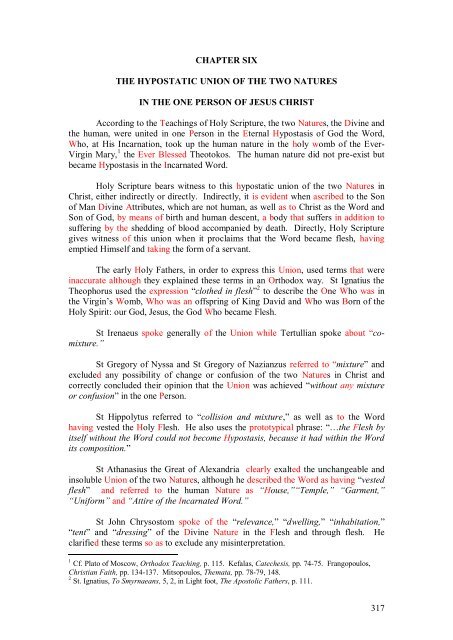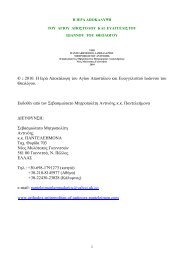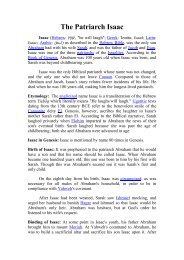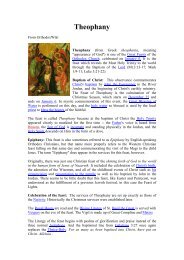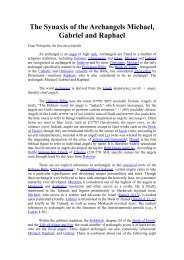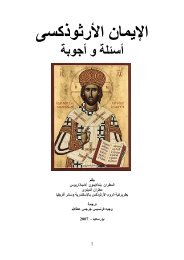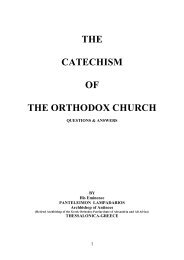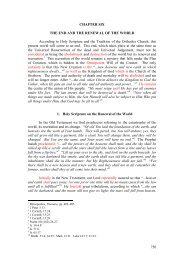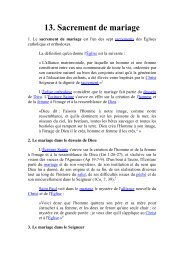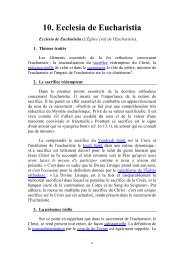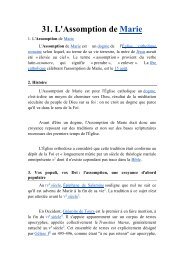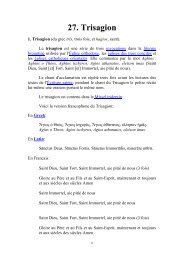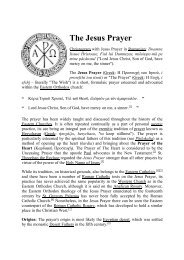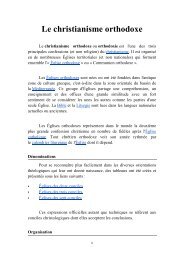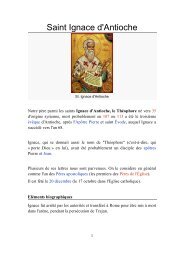028 part 3 chapter 6 the hypostatic union - Orthodox-mitropolitan-of ...
028 part 3 chapter 6 the hypostatic union - Orthodox-mitropolitan-of ...
028 part 3 chapter 6 the hypostatic union - Orthodox-mitropolitan-of ...
You also want an ePaper? Increase the reach of your titles
YUMPU automatically turns print PDFs into web optimized ePapers that Google loves.
CHAPTER SIX<br />
THE HYPOSTATIC UNION OF THE TWO NATURES<br />
IN THE ONE PERSON OF JESUS CHRIST<br />
According to <strong>the</strong> Teachings <strong>of</strong> Holy Scripture, <strong>the</strong> two Natures, <strong>the</strong> Divine and<br />
<strong>the</strong> human, were united in one Person in <strong>the</strong> Eternal Hypostasis <strong>of</strong> God <strong>the</strong> Word,<br />
Who, at His Incarnation, took up <strong>the</strong> human nature in <strong>the</strong> holy womb <strong>of</strong> <strong>the</strong> Ever-<br />
Virgin Mary, 1 <strong>the</strong> Ever Blessed Theotokos. The human nature did not pre-exist but<br />
became Hypostasis in <strong>the</strong> Incarnated Word.<br />
Holy Scripture bears witness to this <strong>hypostatic</strong> <strong>union</strong> <strong>of</strong> <strong>the</strong> two Natures in<br />
Christ, ei<strong>the</strong>r indirectly or directly. Indirectly, it is evident when ascribed to <strong>the</strong> Son<br />
<strong>of</strong> Man Divine Attributes, which are not human, as well as to Christ as <strong>the</strong> Word and<br />
Son <strong>of</strong> God, by means <strong>of</strong> birth and human descent, a body that suffers in addition to<br />
suffering by <strong>the</strong> shedding <strong>of</strong> blood accompanied by death. Directly, Holy Scripture<br />
gives witness <strong>of</strong> this <strong>union</strong> when it proclaims that <strong>the</strong> Word became flesh, having<br />
emptied Himself and taking <strong>the</strong> form <strong>of</strong> a servant.<br />
The early Holy Fa<strong>the</strong>rs, in order to express this Union, used terms that were<br />
inaccurate although <strong>the</strong>y explained <strong>the</strong>se terms in an <strong>Orthodox</strong> way. St Ignatius <strong>the</strong><br />
Theophorus used <strong>the</strong> expression “clo<strong>the</strong>d in flesh” 2 to describe <strong>the</strong> One Who was in<br />
<strong>the</strong> Virgin‟s Womb, Who was an <strong>of</strong>fspring <strong>of</strong> King David and Who was Born <strong>of</strong> <strong>the</strong><br />
Holy Spirit: our God, Jesus, <strong>the</strong> God Who became Flesh.<br />
St Irenaeus spoke generally <strong>of</strong> <strong>the</strong> Union while Tertullian spoke about “comixture.”<br />
St Gregory <strong>of</strong> Nyssa and St Gregory <strong>of</strong> Nazianzus referred to “mixture” and<br />
excluded any possibility <strong>of</strong> change or confusion <strong>of</strong> <strong>the</strong> two Natures in Christ and<br />
correctly concluded <strong>the</strong>ir opinion that <strong>the</strong> Union was achieved “without any mixture<br />
or confusion” in <strong>the</strong> one Person.<br />
St Hippolytus referred to “collision and mixture,” as well as to <strong>the</strong> Word<br />
having vested <strong>the</strong> Holy Flesh. He also uses <strong>the</strong> prototypical phrase: “…<strong>the</strong> Flesh by<br />
itself without <strong>the</strong> Word could not become Hypostasis, because it had within <strong>the</strong> Word<br />
its composition.”<br />
St Athanasius <strong>the</strong> Great <strong>of</strong> Alexandria clearly exalted <strong>the</strong> unchangeable and<br />
insoluble Union <strong>of</strong> <strong>the</strong> two Natures, although he described <strong>the</strong> Word as having “vested<br />
flesh” and referred to <strong>the</strong> human Nature as “House,”“Temple,” “Garment,”<br />
“Uniform” and “Attire <strong>of</strong> <strong>the</strong> Incarnated Word.”<br />
St John Chrysostom spoke <strong>of</strong> <strong>the</strong> “relevance,” “dwelling,” “inhabitation,”<br />
“tent” and “dressing” <strong>of</strong> <strong>the</strong> Divine Nature in <strong>the</strong> Flesh and through flesh. He<br />
clarified <strong>the</strong>se terms so as to exclude any misinterpretation.<br />
1 Cf. Plato <strong>of</strong> Moscow, <strong>Orthodox</strong> Teaching, p. 115. Kefalas, Catechesis, pp. 74-75. Frangopoulos,<br />
Christian Faith, pp. 134-137. Mitsopoulos, Themata, pp. 78-79, 148.<br />
2 St. Ignatius, To Smyrnaeans, 5, 2, in Light foot, The Apostolic Fa<strong>the</strong>rs, p. 111.<br />
317
The Holy Fa<strong>the</strong>rs, during <strong>the</strong> 3 rd Ecumenical Synod, used different terms such<br />
as: “<strong>union</strong>,” “relevance,” “contract,” “<strong>union</strong> by syn<strong>the</strong>sis,” “syn<strong>the</strong>sis,” “comixture,”<br />
“mixture,” “inhabitation” and many o<strong>the</strong>rs, which were used in an<br />
orthodox understanding and manifested <strong>the</strong> Union in <strong>the</strong> one Hypostasis or Person <strong>of</strong><br />
<strong>the</strong> two Natures, not externally or morally connected, but naturally and essentially<br />
United, without any confusion or mixture, perfectly preserving <strong>the</strong>ir own Attributes.<br />
This real and Hypostatic Union <strong>of</strong> <strong>the</strong> two Natures in Christ, was renounced<br />
by <strong>the</strong> heretic Nestorius, who, due to <strong>the</strong> influence <strong>of</strong> <strong>the</strong> <strong>the</strong>ories <strong>of</strong> Aristotle,<br />
supported <strong>the</strong> opinion that true nature co-exists as a personality; hence <strong>the</strong> human<br />
Nature in Christ consists <strong>of</strong> a personality. Consequently, <strong>the</strong> Union <strong>of</strong> <strong>the</strong> two<br />
Natures in Christ is a <strong>union</strong> <strong>of</strong> two Personalities, which is achieved through <strong>the</strong> moral<br />
entrance <strong>of</strong> <strong>the</strong> one into <strong>the</strong> o<strong>the</strong>r, resulting in one moral Personality. It is a Moral<br />
Union, and not a <strong>union</strong> <strong>of</strong> two Natures in one Hypostasis. In this Moral Union <strong>the</strong><br />
two personalities exist separately as two “egos.” Henceforth, Nestorius concluded by<br />
not calling <strong>the</strong> Holy Virgin Mary “Mo<strong>the</strong>r <strong>of</strong> God” (“Theotokos”) but “Mo<strong>the</strong>r <strong>of</strong><br />
Christ” (“Christotokos”) and used <strong>the</strong> terms “well pleased,” “inhabitation,”<br />
“relevance,”and “relative <strong>union</strong>.”<br />
St Cyril <strong>of</strong> Alexandria opposed <strong>the</strong> teachings <strong>of</strong> Nestorius. In <strong>the</strong> 3 rd and 4 th<br />
Ecumenical Synods <strong>the</strong> Truth <strong>of</strong> <strong>the</strong> Doctrine concerning <strong>the</strong> Hypostatic Union <strong>of</strong> <strong>the</strong><br />
two Natures in Christ was clarified. According to this Doctrine, which surpasses all<br />
human understanding, <strong>the</strong> two Natures were united in <strong>the</strong> one [Personality <strong>of</strong> Christ]<br />
being undivided and inseparable, so that one and <strong>the</strong> same Son and Word <strong>of</strong> God<br />
would simultaneously be God and Man, whereas on <strong>the</strong> o<strong>the</strong>r hand, unchangeably and<br />
without confusion, <strong>the</strong> Incarnated Word would be perfect God and perfect Man,<br />
“…without de<strong>part</strong>ing from <strong>the</strong> Divine Nature‟s simplicity…” or its infinite Perfection.<br />
Nei<strong>the</strong>r would “… <strong>the</strong> human nature…” be absorbed by <strong>the</strong> Divine Nature, nor would<br />
it be “…changed into Divine Nature or dissolving into non existence…” However,<br />
nei<strong>the</strong>r by mixture nor confusion <strong>of</strong> <strong>the</strong> two Natures would <strong>the</strong>re be “..something<br />
syn<strong>the</strong>tic resulting from <strong>the</strong> two.” 3 This Doctrine was even more clearly defined when<br />
<strong>the</strong> heresies <strong>of</strong> Nestorianism, 4 Monophysitism 5 and Mono<strong>the</strong>litism 6 made it necessary<br />
for <strong>the</strong> <strong>of</strong>ficial declaration and clarification <strong>of</strong> this Doctrine.<br />
The terms “Nature” and “Essence” on <strong>the</strong> one hand, and <strong>the</strong> “Hypostasis” and<br />
“Person” on <strong>the</strong> o<strong>the</strong>r hand, became synonymous. The Union <strong>of</strong> <strong>the</strong> two Natures or<br />
Essences in <strong>the</strong> God-Man was determined as a “…Union by Hypostasis…” and <strong>the</strong><br />
Incarnated Word was proclaimed as being “…two in Natures, but not in<br />
Hypostases…” when <strong>the</strong> two Natures, <strong>the</strong> Divine and <strong>the</strong> human, united undividedly,<br />
unchangeably and without any mixture in <strong>the</strong> one Person <strong>of</strong> Christ.<br />
Nestorianism was opposed by <strong>the</strong> Archimandrite Eutyches although he came<br />
to an opposite conclusion by characterising <strong>the</strong> Union <strong>of</strong> <strong>the</strong> two Natures as being a<br />
mixture consisting <strong>of</strong> <strong>the</strong> human Nature having been completely absorbed by <strong>the</strong><br />
3 St. John <strong>of</strong> Damascus, Exposition. About <strong>the</strong> two natures, against Monophysites, III, 47, 3, in Migne,<br />
P.G., 94, 988.<br />
4 Kefalas, Synods, pp.118-121.<br />
5 Ibid, pp.141-143.<br />
6 Ibid, pp.160-162.<br />
318
Divine Nature. Thus <strong>the</strong> heresy <strong>of</strong> Monophysitism appeared. An essential role in <strong>the</strong><br />
correct and orthodox opinion opposing this heresy, was that <strong>of</strong> <strong>the</strong> Epistle <strong>of</strong> Pope<br />
Leo I addressed to Flavianus <strong>of</strong> Constantinople. In his letter, Pope Leo I exalted <strong>the</strong><br />
unconfusion <strong>of</strong> <strong>the</strong> two Natures in Christ, which <strong>the</strong> 4 th Ecumenical Synod declared as<br />
an unchangeable, undividable and inseparable Union in <strong>the</strong> one Person.<br />
Leontius Byzantius 7 struggled against <strong>the</strong> heresies <strong>of</strong> <strong>the</strong> Nestorians and<br />
Monophysites who determined that <strong>the</strong> human Nature in Christ was Hypostatic in <strong>the</strong><br />
Word. From Monophysitism derived Mono<strong>the</strong>litism, which was supported by Sergius<br />
<strong>of</strong> Constantinople and accepted by Pope Honorius. This heresy was opposed by<br />
Sophronius and Maximus and was finally condemned by <strong>the</strong> 6 th Ecumenical Synod in<br />
Constantinople (680 A.D.) 8<br />
The basis <strong>of</strong> <strong>the</strong> <strong>the</strong>oretical justification <strong>of</strong> <strong>the</strong> two Wills in Christ was <strong>the</strong><br />
principle: “What is different in essence, is different in will and in energy.” Since in<br />
Christ we have two Essences or Natures, we also confess that <strong>the</strong> two Wills and<br />
Energies are different. Fur<strong>the</strong>rmore, <strong>the</strong> expression concerning “…<strong>the</strong> new Godly<br />
Energy…” was accepted not as a syn<strong>the</strong>tic energy that is composed <strong>of</strong> Divine and<br />
human Energy but for <strong>the</strong> exaltation <strong>of</strong> <strong>the</strong> Unity <strong>of</strong> <strong>the</strong> Person <strong>of</strong> Christ Who is one<br />
and <strong>the</strong> same Who wants and acts in a Godly as well as a human way.<br />
This Union is an unapproachable and inconceivable Mystery, really new and<br />
unknown even to <strong>the</strong> Angels. It is a Union <strong>of</strong> <strong>the</strong> two Natures in one Godly Person,<br />
united without confusion, undividedly and inseparably.<br />
1. The Teachings <strong>of</strong> Holy Scripture Concerning <strong>the</strong> Hypostatic Union<br />
<strong>of</strong> <strong>the</strong> Two Natures in Christ<br />
The Hypostatic Union <strong>of</strong> <strong>the</strong> two Natures in Christ is testified to in Holy<br />
Scripture ei<strong>the</strong>r indirectly or directly, especially in <strong>the</strong> New Testament. It is testified<br />
to indirectly when Christ, as <strong>the</strong> Son <strong>of</strong> God and as God, is ascribed with actions and<br />
sufferings that are completely alien to His Divine Nature although natural to <strong>the</strong><br />
human Nature, or vice versa, when Divine Attributes are ascribed to <strong>the</strong> Son <strong>of</strong> Man<br />
that are unnatural to <strong>the</strong> human Nature, whereas it is directly testified to in a few<br />
verses that clearly proclaim that <strong>the</strong> Word became Man by emptying Himself and<br />
taking <strong>the</strong> form <strong>of</strong> a servant.<br />
Beginning with <strong>the</strong> indirect Testimonies that assure us that “…concerning His<br />
Son Jesus Christ our Lord Who was born <strong>of</strong> <strong>the</strong> seed <strong>of</strong> David according to <strong>the</strong><br />
flesh…” 9 He “…<strong>the</strong> Eternally Blessed God…” descended “…according to <strong>the</strong><br />
flesh…” 10 from <strong>the</strong> “…Israelites…” 11 and is <strong>the</strong> Blessed “…seed <strong>of</strong> Abraham…” 12<br />
The Son <strong>of</strong> God Who, at <strong>the</strong> fullness <strong>of</strong> time, was sent by <strong>the</strong> Fa<strong>the</strong>r and “…was born<br />
7 Leontius Byzantius, Against Nestorians and Eutychians, Homilies I-III; Against Nestorians, Homilies<br />
I-VII, in Migne, P.G., 86, 1268-1768.<br />
8 Kefalas, Synods, pp. 164-169.<br />
9 Rom. 1:3.<br />
10 Rom. 9:5.<br />
11 Rom. 9:4.<br />
12 Rom. 9:7.<br />
319
<strong>of</strong> a woman…” 13 <strong>the</strong>refore was a descendant <strong>of</strong> Abraham. Hence, although He is<br />
“…<strong>the</strong> Word <strong>of</strong> Life…” 14 He “…was manifested…” 15 in <strong>the</strong> midst <strong>of</strong> men and <strong>the</strong><br />
Holy Apostles “…have seen Him with <strong>the</strong>ir eyes and <strong>the</strong>ir hands handled Him…” 16<br />
“… being found in <strong>the</strong> appearance as a Man.” 17 Thus to Christ, as <strong>the</strong> Word and Son<br />
<strong>of</strong> God and God, is ascribed birth and human descendant, life and a human body that<br />
suffered and faced death, which was capable <strong>of</strong> suffering and shedding <strong>of</strong> blood.<br />
Jesus <strong>the</strong> Son <strong>of</strong> Man, as God Who existed “…before Adam was…” 18 “…is <strong>the</strong><br />
same yesterday, today, and for ever.” 19 He pre-existed and came “…into this world to<br />
save sinners…” 20 He “…gives Eternal Life…” to His sheep and no one can “…snatch<br />
<strong>the</strong>m out <strong>of</strong>…” His Hands. 21 In <strong>the</strong> Epistles <strong>of</strong> St Paul, Jesus Christ is called “…our<br />
Lord Jesus Christ…” fifty times. He was “…highly exalted…” after His Resurrection<br />
above “…those in Heaven, and those on earth and those under <strong>the</strong> earth…” 22 as <strong>the</strong><br />
Christ “…Who is over all, <strong>the</strong> Eternally Blessed God…” 23 Who sits on <strong>the</strong> right hand<br />
<strong>of</strong> God 24 and Who is “…far above all Principality and Power and Might and<br />
Dominion…” 25 and is worshipped by all <strong>the</strong> Angels. 26 He sent <strong>the</strong> Holy Spirit to His<br />
Disciples 27 and through Him one sees <strong>the</strong> Fa<strong>the</strong>r because He is in <strong>the</strong> Fa<strong>the</strong>r and <strong>the</strong><br />
Fa<strong>the</strong>r in Him, 28 for <strong>the</strong>y are One. 29 He is “…<strong>the</strong> Only Begotten Son Who is in <strong>the</strong><br />
Bosom <strong>of</strong> <strong>the</strong> Fa<strong>the</strong>r…” 30 “…for in Him dwells all <strong>the</strong> fullness <strong>of</strong> <strong>the</strong> Godhead<br />
bodily.” 31 He Who was touched by St Thomas and bears <strong>the</strong> prints <strong>of</strong> <strong>the</strong> nails on His<br />
Hands and Feet, is our Lord and God. 32 By “…looking for <strong>the</strong> Blessed Hope and<br />
Glorious Appearing <strong>of</strong> our great God and Saviour Jesus Christ…” 33 we await Him as<br />
“…our true God…” 34 “…Who is <strong>the</strong> Eternally Blessed God.” 35<br />
From <strong>the</strong> above Biblical verses and many o<strong>the</strong>rs, it is obvious that <strong>the</strong> One<br />
Whom St Paul calls “…<strong>the</strong> Man Christ Jesus…” 36 has Divine Attributes and Who not<br />
only as Man is perfect but as God is truly <strong>the</strong> One “…Who came down from<br />
Heaven…” 37 and as <strong>the</strong> Son <strong>of</strong> Man, dwelt among men in <strong>the</strong> Flesh, simultaneously<br />
13 Gal. 4:4.<br />
14 1 John 1:1.<br />
15 1 John 1:2.<br />
16 1 John 1:1.<br />
17 Phil. 2:8.<br />
18 John 8:58.<br />
19 Heb. 13:8.<br />
20 1 Tim. 1:15.<br />
21 John 10:27-28.<br />
22 Phil. 2:9, 10.<br />
23 Rom. 9:5.<br />
24 Mark 16:19.<br />
25 Ephes. 1:21.<br />
26 Rev. 5:11-14.<br />
27 John 15:26.<br />
28 John 14:9-10.<br />
29 John 10:30.<br />
30 John 1:18.<br />
31 Col. 2:9.<br />
32 John 20:27-29.<br />
33 Tit. 2:13.<br />
34 1 John 5:20.<br />
35 Rom. 9:5.<br />
36 1 Tim. 2:5.<br />
37 John 3:13.<br />
320
eing in Heaven as “…<strong>the</strong> Only Begotten Son <strong>of</strong> God...” 38 “…Who is in <strong>the</strong> Bosom <strong>of</strong><br />
<strong>the</strong> Fa<strong>the</strong>r.” 39 Christ Himself, whenever He spoke <strong>of</strong> Himself, confirmed that <strong>the</strong><br />
Only Begotten Son <strong>of</strong> God is <strong>the</strong> same as <strong>the</strong> Son <strong>of</strong> Man.<br />
The Hypostatic Union <strong>of</strong> <strong>the</strong> Divine and human Natures <strong>of</strong> Christ is evident in<br />
<strong>the</strong> Biblical verses <strong>of</strong> St John 1:14: “…And <strong>the</strong> Word became flesh and dwelt among<br />
us…” and in St Paul‟s Epistle to <strong>the</strong> Philippians 2:6-7: “…Who, being in <strong>the</strong> form <strong>of</strong><br />
God, did not consider it robbery to be equal with God, but made Himself <strong>of</strong> no<br />
reputation, taking <strong>the</strong> form <strong>of</strong> a bondservant, and coming in <strong>the</strong> likeness <strong>of</strong> men.” St<br />
Paul proclaimed <strong>the</strong> Eternal pre-existence <strong>of</strong> Jesus Christ as being in <strong>the</strong> form <strong>of</strong> God<br />
by Nature and not by robbery, stating that He emptied Himself [<strong>of</strong> His Divine<br />
Majesty] by coming in <strong>the</strong> likeness <strong>of</strong> men. One must note that in <strong>the</strong> first verse <strong>the</strong><br />
words “…and <strong>the</strong> Word became flesh…” is equivalent to “…<strong>the</strong> Word became<br />
Man…” as Holy Scripture usually refers to “flesh” as being <strong>the</strong> whole “man.” 40 He<br />
became Flesh “…without changing His Essence into flesh…” “…for <strong>the</strong> Divine<br />
Essence is beyond any change…” “…but taking up…” human nature, “…that Essence<br />
remained untouched.” 41 In o<strong>the</strong>r verses Christ is presented as “…coming in flesh…” 42<br />
and that “…He came forth from <strong>the</strong> Fa<strong>the</strong>r and had come into <strong>the</strong> world…” 43 by<br />
“…coming down from Heaven.” 44<br />
St John Chrysostom commented that “…<strong>the</strong> Son <strong>of</strong> God did not grab <strong>the</strong><br />
Principal, but had it by Nature, permanent and secured. He was not afraid to descend<br />
from <strong>the</strong> Rank…” so He emptied Himself, taking up “…what He was not and<br />
becoming flesh He remained God, being <strong>the</strong> Word.” 45 Thus after <strong>the</strong> Incarnation<br />
“…He has two forms. For <strong>the</strong> Son <strong>of</strong> God being Man and God did not dissolve <strong>the</strong><br />
Divine Form, nei<strong>the</strong>r being God rejected <strong>the</strong> human Form.” 46<br />
2. The Teachings <strong>of</strong> <strong>the</strong> Apostolic Fa<strong>the</strong>rs and Apologists<br />
In <strong>the</strong> Teachings <strong>of</strong> <strong>the</strong> Apostolic Fa<strong>the</strong>rs one clearly finds <strong>the</strong> Doctrine<br />
concerning <strong>the</strong> Hypostatic Union <strong>of</strong> <strong>the</strong> two Natures in Christ, although <strong>the</strong>y ignore<br />
<strong>the</strong> exact Doctrinal term that declares this Union. Thus in <strong>the</strong> Epistle <strong>of</strong> Barnabas it is<br />
specified that “…<strong>the</strong> Lord…” Who “…submitted to suffer for our souls…” “…is Lord<br />
<strong>of</strong> <strong>the</strong> whole world, to Whom God said at <strong>the</strong> foundation <strong>of</strong> <strong>the</strong> world, „Let Us make<br />
man according to Our Image and Likeness‟” and “…<strong>the</strong> Son <strong>of</strong> God, Who is Lord<br />
and is destined to Judge <strong>the</strong> living and <strong>the</strong> dead.” 47<br />
38 John 1:14-15.<br />
39 John1:18.<br />
40 St. Athanasius <strong>the</strong> Great, To Serapion II, § 7; Against Arians, IV, § 30, in Migne, P.G., 26, 620 and<br />
388.<br />
41 St. John Chrysostom, To John 1:14, in Monfaucon, v.8, p. 74.<br />
42 1 John 4:2.<br />
43 John 16:28.<br />
44 John 6:41.<br />
45 St. John Chrysostom, To Philippians 2:6, 7, in Montfaucon, v. 9, pp. 282 and 285.<br />
46 St. Athanasius <strong>the</strong> Great, Fragments from <strong>the</strong> Against Arians, in Migne, P.G., 26, 1256.<br />
47 Barnabas, 5, 5 and 7, 2, in Light foot, The Apostolic Fa<strong>the</strong>rs, pp. 167 and170.<br />
321
St Ignatius <strong>the</strong> Theophorus <strong>of</strong> Antioch used <strong>the</strong> term “…clo<strong>the</strong>d in flesh…” 48<br />
signifying <strong>the</strong> Incarnation <strong>of</strong> <strong>the</strong> Lord. He explained that “…<strong>the</strong>re is one Physician,<br />
Who is both flesh and spirit, born and unborn, God in Man, true Life in death, both<br />
from Mary and from God.” 49 “For our God Jesus <strong>the</strong> Christ was conceived by Mary<br />
according to God‟s Plan, both from <strong>the</strong> seed <strong>of</strong> David and <strong>of</strong> <strong>the</strong> Holy Spirit. He was<br />
born and was baptised…” 50 and His suffering is “…<strong>the</strong> suffering <strong>of</strong> God…” 51 as His<br />
Blood is “…<strong>the</strong> Blood <strong>of</strong> God.” 52 Thus it is made clear that He Who was Crucified<br />
for us is God‟s “…Son, Who is His Word…” 53 “…Christ our God…” 54 “…Who was<br />
<strong>of</strong> <strong>the</strong> family <strong>of</strong> David; Who was <strong>the</strong> Son <strong>of</strong> Mary; Who was really born, Who both ate<br />
and drank; Who was really persecuted under Pontius Pilate; Who was really crucified<br />
and died while those in Heaven and on earth and under <strong>the</strong> earth looked on; Who,<br />
moreover, was really raised from <strong>the</strong> dead when His Fa<strong>the</strong>r raised Him up.” 55<br />
According to The Epistle to Diognetus, “…<strong>the</strong> omnipotent Creator <strong>of</strong> all, <strong>the</strong><br />
invisible God…” “…sent to men…” “…<strong>the</strong> Designer and Creator <strong>of</strong> <strong>the</strong> Universe<br />
Himself…” “…by Whom all things have been ordered and determined and placed in<br />
subjection…” God “…sent Him as a Man to men…” “…as a king might send his son<br />
who is a king, He sent Him as God.” 56 God “…did not hate us, or reject us, or bear a<br />
grudge against us; instead He was patient and forbearing; in His Mercy He took upon<br />
Himself our sins; He Himself gave up His own Son as a ransom for us.” 57 Jesus<br />
Christ Who was crucified for us and was sent as a Man, is one and <strong>the</strong> same with <strong>the</strong><br />
Creator and Provider and Preserver <strong>of</strong> all things.<br />
According to “The Shepherd <strong>of</strong> Hermas,” “…<strong>the</strong> Son <strong>of</strong> God is far older than<br />
all His Creation, with <strong>the</strong> result that He was <strong>the</strong> Fa<strong>the</strong>r‟s Counsellor in His<br />
Creation…” and “…He was revealed in <strong>the</strong> last days <strong>of</strong> <strong>the</strong> Consummation; that is<br />
why <strong>the</strong> Door is new, in order that those who are going to be Saved may enter <strong>the</strong><br />
Kingdom <strong>of</strong> God through It.” 58<br />
According to <strong>the</strong> Apologists, “…<strong>the</strong> Lord Jesus Christ…” is “…<strong>the</strong> Son <strong>of</strong> <strong>the</strong><br />
High God…” Who “…came down from Heaven for <strong>the</strong> Salvation <strong>of</strong> men…” 59 Who<br />
“…was born from a Holy Virgin without seed and imperishably took up Flesh…” He<br />
is “…<strong>the</strong> Word <strong>of</strong> God…” Who “..became Man for <strong>the</strong> human race…” “…Who was<br />
born according to <strong>the</strong> Will <strong>of</strong> God and Fa<strong>the</strong>r…” “…and becoming <strong>part</strong>aker <strong>of</strong> our<br />
passions…” in order “…to heal <strong>the</strong>m.” 60 “He pre-existed…” as “…<strong>the</strong> Son <strong>of</strong> <strong>the</strong><br />
Creator <strong>of</strong> all, being God and becoming Man through <strong>the</strong> Virgin…” “…suffering <strong>the</strong><br />
same as us, having flesh as man born from men.” 61 Hence <strong>the</strong> Holy Gospel proclaims<br />
48 St. Ignatius, To Smyrnaeans, 5, 2, in Light foot, The Apostolic Fa<strong>the</strong>rs, p. 111.<br />
49 Ibid, To Ephesians, 7, 2, in Light foot, The Apostolic Fa<strong>the</strong>rs, p. 88.<br />
50 St. Ignatius, To <strong>the</strong> Smyrnaeans, 18, 2, in Light foot, The Apostolic Fa<strong>the</strong>rs, p. 92.<br />
51 Ibid, To <strong>the</strong> Romans, 6, 3, in Light foot, The Apostolic Fa<strong>the</strong>rs, p. 104.<br />
52 Ibid, To <strong>the</strong> Ephesians, 1, 1, in Light foot, The Apostolic Fa<strong>the</strong>rs, p. 86.<br />
53 Ibid, To <strong>the</strong> Magnesians, 8, 2, in Light foot, The Apostolic Fa<strong>the</strong>rs, p. 95.<br />
54 Ibid, To <strong>the</strong> Romans, Introduction, in Light foot, The Apostolic Fa<strong>the</strong>rs, p. 101.<br />
55 Ibid, To <strong>the</strong> Trallians, 9, 1-2, in Light foot, The Apostolic Fa<strong>the</strong>rs, p. 100.<br />
56 The Epistle to Diognetus, 7, 2 and 4, in Light foot, The Apostolic Fa<strong>the</strong>rs, pp. 300 and 301.<br />
57 Ibid, 9, 2, in Light foot, The Apostolic Fa<strong>the</strong>rs, p. 302.<br />
58 Shepherd <strong>of</strong> Hermas, Parable 9, 12, 2 and 3, in Light foot, The Apostolic Fa<strong>the</strong>rs, p. 272.<br />
59 Aristides, Apology, 15, in B, v. 3, p. 147.<br />
60 St. Justin, <strong>the</strong> philosopher and martyr, 1 Apology, 63, §§ 4 and 10. Ibid, 2 Apology, 6, § 5 and 13, §<br />
4; Ibid, Dialogue 48, § 2-3, in B, v. 3, pp. 195-196, 203, 207 and 250-251.<br />
61 Tatianus, Homily to <strong>the</strong> Greeks, § 21, in B, v. 4, 256.<br />
322
“…that God has become in <strong>the</strong> likeness <strong>of</strong> Man…” He Who “…is God and perfect<br />
Man, assured us that He has <strong>the</strong> two Essences <strong>of</strong> His Deity and His humanity.” 62<br />
3. The Teachings <strong>of</strong> St Irenaeus, Tertullian and St Hippolytus<br />
The Ecclesiastic Scholars who followed after <strong>the</strong> Apologists, St Irenaeus,<br />
Tertullian and St Hippolytus ascribed more accurate expressions to <strong>the</strong> Doctrine <strong>of</strong> <strong>the</strong><br />
Hypostatic Union <strong>of</strong> <strong>the</strong> two Natures in <strong>the</strong> one Person <strong>of</strong> Jesus Christ.<br />
St Irenaeus spoke <strong>of</strong> “…<strong>the</strong> Union <strong>of</strong> <strong>the</strong> Word <strong>of</strong> God with His Creation.” 63<br />
This terminology is used by later Fa<strong>the</strong>rs 64 although it does not express <strong>the</strong> Hypostatic<br />
Union alone but can be used to describe <strong>the</strong> meaning <strong>of</strong> <strong>the</strong> Moral Union (e.g. <strong>the</strong><br />
<strong>union</strong> <strong>of</strong> man and woman in marriage or our Union with God [in Holy Comm<strong>union</strong>]),<br />
as well as that <strong>of</strong> <strong>the</strong> mixture <strong>of</strong> two different elements (e.g. <strong>the</strong> wine and water [for<br />
Holy Eucharist]). St Irenaeus, and <strong>part</strong>icularly Tertullian, used <strong>the</strong> terms “commisti”<br />
“commixtus” 65 and “commixtio,” 66 meaning “mixture” as applied by <strong>the</strong> great Holy<br />
Fa<strong>the</strong>rs. 67 Although <strong>the</strong>se terms express <strong>the</strong> close, undivided and inseparable Union<br />
<strong>of</strong> <strong>the</strong> two Natures, <strong>the</strong>y do not exclude <strong>the</strong> confusion, change and syn<strong>the</strong>tic result <strong>of</strong><br />
something new. St Irenaeus, Tertullian and St Hippolytus, as well as <strong>the</strong> rest <strong>of</strong> <strong>the</strong><br />
Holy Fa<strong>the</strong>rs, fur<strong>the</strong>r explained this Union and Mixture <strong>of</strong> <strong>the</strong> two Natures,<br />
determining in an orthodox way <strong>the</strong> Doctrine <strong>of</strong> <strong>the</strong> Hypostatic Union.<br />
St Irenaeus declared <strong>the</strong> faith “…in one Jesus Christ, <strong>the</strong> Son <strong>of</strong> God, Who was<br />
Incarnated for our Salvation…” 68 Who not only simply dwelt in <strong>the</strong> Man Jesus but<br />
being <strong>the</strong> exact Word, <strong>the</strong> Only begotten Son <strong>of</strong> God, was Incarnated for us in such a<br />
way that <strong>the</strong> Son <strong>of</strong> <strong>the</strong> High God and <strong>the</strong> Son <strong>of</strong> David is one and <strong>the</strong> same Person. 69<br />
And our Lord “…Jesus Who suffered for us, Who dwelt in us … is <strong>the</strong> Word <strong>of</strong><br />
God…” “…<strong>the</strong> Only Begotten Son Who, according to <strong>the</strong> pleasing Will <strong>of</strong> <strong>the</strong> Fa<strong>the</strong>r,<br />
became Man for men…” 70 and becoming as we are, although remaining God<br />
Almighty and Unspeakably having His Generation, 71 became visible, He Who is<br />
62 Meliton Sardeis, Extract 7, in Migne, P.G., 5, 1221.<br />
63 St. Irenaeus, Heresies, IV, 33, 11 and III, 18, 6, in Migne, P.G., 7, 1080 and 937. Cf. Ibid, in<br />
Hadjephraimides, pp. 333-334, 242.<br />
64 St. Athanasius <strong>the</strong> Great, Epistle to Epictetus, § 9, in Migne, P.G., 26, 1065. St. Gregory <strong>of</strong> Nyssa,<br />
Catechesis, ch. 10 and 11, in Migne, P.G., 45, 41 and 44. St. Gregory <strong>of</strong> Nazianzus, Epistle 101, in<br />
Migne, P.G., 37, 181 and 188.<br />
65 St. Irenaeus, Heresies, book III, ch. 19, § 1, in Migne, P.G., 7, 938. Cf. Ibid, in Hadjephraimides, pp.<br />
243-244.<br />
66 Tertullian, Apologeticus, 21, in migne, P.L., 1, 457; and Ibid, Adversus Marcianem, II, 27, in migne,<br />
P.L., 2, 345. St. Hippolytus, About Christ and Antichrist, IV, in B, v. 6, p. 199.<br />
67 St. Gregory <strong>of</strong> Nazianzus, Homily 45, § 11, in Migne, P.G., 33, 633. Ibid, 2 Apology,§ 23, in<br />
Migne, P.G., 35, 431. Ibid, Homily 38, § 13, in Migne, P.G., 36, 325. St. Gregory <strong>of</strong> Nyssa,<br />
Catechesis, § 35, in Migne, P.G., 45, 66. Ibid, Against Apollinarius, in Migne, P.G., 45, 1275. St.<br />
Cyril <strong>of</strong> Alexandria, Against Nestorius, book I, ch. 3, in Migne, P.G., 76, 33. Ibid, Treasure, 24, in<br />
Migne, P.G., 75, 399.<br />
68 St. Irenaeus, Heresies, book I, ch. 10, § 1, in Migne, P.G., 7, 549. Cf. Ibid, in Hadjephraimides, pp.<br />
64-65.<br />
69 St. Irenaeus, Heresies, book III, ch. 16, §§ 1-3, in Migne, P.G., 7, 919-922. Cf. Ibid, in<br />
Hadjephraimides, pp. 230-233.<br />
70 St. Irenaeus, Heresies, book I, ch. 9, § 3, in Migne, P.G., 7, 541. Cf. Ibid, in Hadjephraimides, p. 63.<br />
71 St. Irenaeus, Heresies, book IV, ch. 33, § 11, in Migne, P.G., 7, 1080. Cf. Ibid, in Hadjephraimides,<br />
pp. 333-334.<br />
323
Invisible, conceivable He Who is Inconceivable and suffering, He Who is above all<br />
suffering and <strong>the</strong> Word Man, resuming all things to Himself, 72 “…in order that as <strong>the</strong><br />
Word is <strong>the</strong> Prince in <strong>the</strong> Heavenly and Spiritual and Invisible, likewise for Him to<br />
have <strong>the</strong> Dominion among <strong>the</strong> visible and bodily.” 73<br />
Thus “…<strong>the</strong> Carnation…” was “…<strong>the</strong> pure Birth <strong>of</strong> <strong>the</strong> Word <strong>of</strong> God…” and<br />
those who renounce it “…are ungrateful to <strong>the</strong> Incarnated Word <strong>of</strong> God Who, for this<br />
reason … became Man, in order that man, by vesting <strong>the</strong> Word, enjoys <strong>the</strong> Adoption<br />
and becomes a son <strong>of</strong> God.” Thus Christ had a double Nature, “…as Man, in order to<br />
be tempted, likewise as <strong>the</strong> Word in order to be glorified; <strong>the</strong> Word being peaceful<br />
when He was tempted and crucified and dying, being related to man in being<br />
victorious and patient and being Raised and lifted up.” Hence <strong>the</strong> Son <strong>of</strong> God, our<br />
Lord, being <strong>the</strong> Word <strong>of</strong> <strong>the</strong> Fa<strong>the</strong>r as well as <strong>the</strong> Son <strong>of</strong> Man because He was from<br />
<strong>the</strong> Ever Blessed Virgin Mary who had her generation from men and who was human,<br />
was born in accordance to man and thus became <strong>the</strong> Son <strong>of</strong> Man. 74 Proclaiming<br />
elsewhere that <strong>the</strong> Union <strong>of</strong> <strong>the</strong> two Natures in <strong>the</strong> one Hypostatic Person <strong>of</strong> Jesus<br />
Christ classifies those who divide <strong>the</strong> Lord into two different Hypostases 75 as<br />
blasphemers.<br />
St Hippolytus, stressing <strong>the</strong> <strong>union</strong> <strong>of</strong> <strong>the</strong> two Natures in Christ, asserted that<br />
Christ “…coming into <strong>the</strong> world as God, was revealed in flesh.” “For <strong>the</strong> bodiless<br />
Word <strong>of</strong> God vested <strong>the</strong> holy flesh from <strong>the</strong> Virgin [and] as a vested Bridegroom [He<br />
assumed] <strong>the</strong> suffering on <strong>the</strong> Cross.” He continues: “…in order to mix our mortal<br />
body to His own Power”. He achieved this “...by mixing <strong>the</strong> mortal to <strong>the</strong> Immortal<br />
and <strong>the</strong> weak to <strong>the</strong> powerful in order to save <strong>the</strong> lost man…” Using <strong>the</strong> terms “mix”<br />
and “mixing” he stresses <strong>the</strong> undivided and inseparable natural and essential <strong>union</strong>.<br />
The prototypical explanation that “…<strong>the</strong> flesh on its own without <strong>the</strong> Word<br />
could not exist, for it has its existence in <strong>the</strong> Word…” belongs to St Hippolytus. In<br />
o<strong>the</strong>r words, <strong>the</strong> central line <strong>of</strong> <strong>the</strong> Doctrine <strong>of</strong> <strong>the</strong> Hypostatic Union, according to<br />
which <strong>the</strong> Incarnated Divine Nature was not incarnated in a human hypostasis that<br />
already pre-existed but that <strong>the</strong> human nature became Hypostasis in <strong>the</strong> Word <strong>of</strong> <strong>the</strong><br />
Hypostasis <strong>of</strong> <strong>the</strong> Word, which was already Hypostasis. St Hippolytus used <strong>the</strong> terms<br />
“mix” and “mixture” excluding any confusion or change or alteration <strong>of</strong> <strong>the</strong> two<br />
Natures. 76<br />
The expressions <strong>of</strong> Tertullian being exact and accurate, were adopted by <strong>the</strong><br />
Holy Ecumenical Synods. According to Tertullian, we see double <strong>the</strong> Natural<br />
condition that is not confused but united in <strong>the</strong> one Person <strong>of</strong> <strong>the</strong> God and Man Jesus.<br />
Fur<strong>the</strong>rmore, <strong>the</strong> attributes <strong>of</strong> each Essence remain unharmed and act according to its<br />
72<br />
St. Irenaeus, Heresies, book III, ch. 16, § 6, in Migne, P.G., 7, 925-926. Cf. Ibid, in<br />
Hadjephraimides, pp. 234-235.<br />
73<br />
St. Irenaeus, Heresies, book III, ch. 16, § 6, in Migne, P.G., 7, 925-926. Cf. Ibid, in<br />
Hadjephraimides, pp. 234-235.<br />
74 St. Irenaeus, Heresies, book III, ch. 19, §§ 1 and 3, in Migne, P.G., 7, 939 and 941. Cf. Ibid, in<br />
Hadjephraimides, pp. 243-244 and 244-245.<br />
75 St. Irenaeus, Heresies, book III, ch. 16, § 5, in Migne, P.G., 7, 925. Cf. Ibid, in Hadjephraimides, pp.<br />
233-234.<br />
76 St. Hippolytus, To <strong>the</strong> heresy <strong>of</strong> Noetus, 15, 17; Ibid, About Christ and Anti-Christ, 4; in B, v. 6, pp.<br />
19, 20-21, 199.<br />
324
own attributes such as <strong>the</strong> virtues, <strong>the</strong> works and <strong>the</strong> signs. 77 It is obvious, when<br />
Tertullian uses <strong>the</strong> terms “commixtio”, “mixtus” and “commisti”, he wants to express<br />
<strong>the</strong> inseparable and undivided <strong>union</strong> <strong>of</strong> <strong>the</strong> two natures, and under no condition <strong>the</strong><br />
mixing or confusion or <strong>the</strong>ir syn<strong>the</strong>tic change.<br />
4. Complete Clarification <strong>of</strong> <strong>the</strong> Union <strong>of</strong> <strong>the</strong> Two Natures and Accurate Terms<br />
The heresy <strong>of</strong> Apollinarios 78 made it necessary to completely clarify <strong>the</strong><br />
manner <strong>of</strong> <strong>the</strong> Union <strong>of</strong> <strong>the</strong> two Natures in Christ, <strong>the</strong>reby gradually establishing more<br />
accurate terms in order to explain this Union. 79 St Alexandros <strong>the</strong> Great <strong>of</strong><br />
Alexandria, in his letter to Alexandros <strong>of</strong> Constantinople, spoke <strong>of</strong> <strong>the</strong><br />
“…Unchangeability <strong>of</strong> <strong>the</strong> Word…” at <strong>the</strong> Incarnation and introduced <strong>the</strong> term<br />
“Unchangeable,” which subsequently <strong>the</strong> 4 th Ecumenical Synod <strong>of</strong> Chalcedon<br />
accepted.<br />
St Athanasius <strong>the</strong> Great <strong>of</strong> Alexandria, explaining <strong>the</strong> unchangeable <strong>union</strong> <strong>of</strong><br />
<strong>the</strong> two Natures that are <strong>hypostatic</strong>ally united in <strong>the</strong> God-Man, observed that<br />
“…nei<strong>the</strong>r is man <strong>the</strong> Son <strong>of</strong> God…” nor did God abolish “… <strong>the</strong> Divine Form; nor<br />
being God [did He renounce] <strong>the</strong> human form.” In <strong>the</strong> God-Man “…two things were<br />
united; two in one. For nei<strong>the</strong>r God <strong>the</strong> Word is divided from <strong>the</strong> body, nor do we see<br />
two Sons and Christs, but <strong>the</strong> Son <strong>of</strong> God Who is before all ages and in later times<br />
became perfect Man.” Hence <strong>the</strong> human Nature <strong>of</strong> <strong>the</strong> Lord, although “… being from<br />
<strong>the</strong> Creation…”, “... became flesh…” Consequently, “…when we see that body, we<br />
do not refrain from worshipping <strong>the</strong> Word or, wanting to worship <strong>the</strong> Word, we do not<br />
de<strong>part</strong> from <strong>the</strong> flesh.”<br />
The Body became God‟s Body, for <strong>the</strong> Word <strong>of</strong> God at <strong>the</strong> Incarnation did not<br />
“…inhabit a Holy Man, but <strong>the</strong> same Word became Flesh…” and “…being truly <strong>the</strong><br />
Son <strong>of</strong> God, became also <strong>the</strong> Son <strong>of</strong> Man.” And “…<strong>the</strong> Son <strong>of</strong> God, Who was before<br />
Abraham, was not different from <strong>the</strong> one after Abraham, but He was <strong>the</strong> same Who<br />
asks „Where is Lazarus placed?‟ whom He Divinely Raised.” From <strong>the</strong> beginning<br />
“…<strong>the</strong> Flesh became <strong>the</strong> Word‟s and not any man‟s…” and “…by unconfused Natural<br />
Union…” <strong>the</strong> human Nature became <strong>the</strong> Flesh <strong>of</strong> <strong>the</strong> Word. Thus <strong>the</strong> Lord was<br />
Incarnated “…not showing change in <strong>the</strong> Deity…” but “…receiving everything from<br />
<strong>the</strong> Virgin, everything which God at <strong>the</strong> beginning used for <strong>the</strong> creation <strong>of</strong> man<br />
without sin, natural birth and inseparable Union, a new Creation from <strong>the</strong> Virgin‟s<br />
Womb He raised Himself.” Because <strong>the</strong> Flesh is not <strong>of</strong> <strong>the</strong> same Essence<br />
(Omoousios) as that <strong>of</strong> <strong>the</strong> Divine Nature, <strong>the</strong> Union with <strong>the</strong> Divinity was made<br />
“…Hypostatic. For <strong>the</strong> Consubstantial (Omoousion) to <strong>the</strong> Consubstantial Union by<br />
Hypostasis was by Nature.” For this inseparable “…and undivided…” and by<br />
Hypostasis Union “…<strong>the</strong> Son Who suffered was not different from <strong>the</strong> One Who<br />
suffered. For <strong>the</strong> Word was not different from Him Who took up death and<br />
suffering…” but “…He Who is confessed … truly suffered and is without suffering…”<br />
“…in order to be truly Man and truly God.” According to <strong>the</strong> above, St Athanasius<br />
elsewhere referred to <strong>the</strong> Word as “vested flesh” or <strong>of</strong> <strong>the</strong> Word‟s “Comm<strong>union</strong> and<br />
Union” with <strong>the</strong> Body, describing <strong>the</strong> human Nature as being <strong>the</strong> “House,” “Temple,”<br />
77 Tertullian, Adversus Praxeam, XXVII, in migne, P.L., 2, 215.<br />
78 Kefalas, Synods, pp.111-112<br />
79 Lossky, Theology, pp. 95-100.<br />
325
“Instrument,” “Vestment,” and “Garment” <strong>of</strong> <strong>the</strong> Incarnated Word. 80 However, <strong>the</strong>se<br />
terms under no circumstances were used by St Athanasius to express <strong>the</strong> external but<br />
not <strong>the</strong> Hypostatic Union <strong>of</strong> <strong>the</strong> two Natures in Christ.<br />
Didymus <strong>the</strong> Blind proclaimed in an orthodox manner that this Union <strong>of</strong> <strong>the</strong><br />
two Natures in Christ exist as “…o<strong>the</strong>r and o<strong>the</strong>r…” not “…ano<strong>the</strong>r and ano<strong>the</strong>r.”<br />
They are two different Natures in <strong>the</strong> God-Man, not two different Persons, although<br />
<strong>the</strong> different Natures exist in one and <strong>the</strong> same (Person.) Concerning <strong>the</strong> Lord‟s<br />
human Nature, Didymus observed that “…according to <strong>the</strong> Economia, <strong>the</strong> Word <strong>of</strong><br />
God became Flesh unchangeable and completely and truly; as one Person said to be<br />
Divine and human.” 81<br />
St Gregory <strong>of</strong> Nyssa and St Gregory <strong>the</strong> Theologian <strong>of</strong> Nazianzus, so as to<br />
explain <strong>the</strong> Union <strong>of</strong> <strong>the</strong> two Natures, used <strong>the</strong> terms “mixture,” “physique” and<br />
“commixture.” Never<strong>the</strong>less St Gregory <strong>of</strong> Nazianzus determined that “…this new<br />
mixture <strong>of</strong> God and man…” in order to be “…one from two and through one two…” 82<br />
although “…<strong>the</strong> natures are two, <strong>the</strong> sons are not two, nor are <strong>the</strong>y two gods.” In <strong>the</strong><br />
Saviour it is distinguished as being <strong>the</strong> “…o<strong>the</strong>r and o<strong>the</strong>r, those <strong>of</strong> which <strong>the</strong> Saviour<br />
consists, and not ano<strong>the</strong>r from ano<strong>the</strong>r.” Determining this he observed that we<br />
should confess that <strong>the</strong> Holy Trinity is “…ano<strong>the</strong>r and ano<strong>the</strong>r, in order not to<br />
confuse <strong>the</strong> Hypostases…” but never <strong>the</strong> “…o<strong>the</strong>r and o<strong>the</strong>r…” because <strong>the</strong> one<br />
Essence in <strong>the</strong> Trinity is “…one in <strong>the</strong> Three and <strong>the</strong> same in <strong>the</strong> Deity.” On <strong>the</strong> o<strong>the</strong>r<br />
hand, it is stressed that this “…mixture in one…” <strong>of</strong> <strong>the</strong> two Natures was not made for<br />
confusion <strong>of</strong> change. But <strong>the</strong> Incarnated God is “…suffering in Flesh, without<br />
passion in <strong>the</strong> Deity, describable in Body, indescribable in Spirit, He Himself earthly<br />
and Heavenly, visible and intellectual, containable and uncontainable.” Henceforth,<br />
he who does not “…worship <strong>the</strong> Crucified, let him be ana<strong>the</strong>ma and let <strong>the</strong>m be with<br />
those who killed God…” as he is condemned and <strong>the</strong> o<strong>the</strong>r, who “…does not take in<br />
consideration as <strong>the</strong> Theotokos <strong>the</strong> Holy Mary.” This name is to be properly<br />
addressed to <strong>the</strong> Mo<strong>the</strong>r <strong>of</strong> <strong>the</strong> Lord because “…no man was formed…” in her, in<br />
order that “…afterwards God will vest…” him. For this will not be “…a birth <strong>of</strong> God,<br />
but avoidance <strong>of</strong> birth.” St Gregory clearly determined that by saying “mixture,”<br />
does not mean confusion and change, but Union inseparable from <strong>the</strong> two Natures, <strong>the</strong><br />
human never having received its own hypostasis, but from <strong>the</strong> beginning within <strong>the</strong><br />
Virgin‟s Womb was united <strong>hypostatic</strong>ally with <strong>the</strong> Incarnated Lord and remaining<br />
forever united. St Gregory renounced everyone who would deny “… <strong>the</strong> holy flesh”<br />
or say “<strong>the</strong> Deity stripped from <strong>the</strong> body.” 83<br />
St Gregory <strong>of</strong> Nyssa unmistakably distinguished <strong>the</strong> Attributes <strong>of</strong> each <strong>of</strong> <strong>the</strong><br />
two Natures <strong>of</strong> Christ. “The humanity (<strong>of</strong> Jesus) was raised after <strong>the</strong> Suffering and<br />
through <strong>the</strong> Lord, became <strong>the</strong> Christ…” when “…He was raised on <strong>the</strong> right hand <strong>of</strong><br />
God and became, instead <strong>of</strong> <strong>the</strong> subject, Christ <strong>the</strong> King, instead <strong>of</strong> <strong>the</strong> humble <strong>the</strong><br />
80 St. Athanasius <strong>the</strong> Great, Fragments from Against Heresies; Ibid, To Adelphius. § 3; Ibid, The<br />
volume to Antiochean, § 7; Ibid, Against Apollinarius, Homily I, §§ 10 and 12, and Homily II, §§ 2, 5<br />
and 6; Ibid, Against Arians, Homily II, § 69; Ibid, To Epictetus, §§ 9 and 10; Ibid, Against Arians,<br />
Homily III, §§ 34, 52 and 53; Ibid, To Adelphius, §§ 3 and 4; in Migne, 26, 1256, 1076, 804, 1109,<br />
1140, 1113, 1333, 1140, 293, 1065, 396, 397, 433, 1068 and 1076.<br />
81 Didymus <strong>the</strong> Blind, About <strong>the</strong> Trinity, III, 12; Ibid, To Psalms, in Migne, P.G., 39, 860 and 1232.<br />
82 St. Gregory <strong>of</strong> Nazianzus, Homily II Apology, § 23, in Migne, P.G., 35, 432.<br />
83 Ibid, Epistle 101 to Cledonius, in Migne, P.G., 37, 180.<br />
326
Highest, instead <strong>of</strong> <strong>the</strong> Man <strong>the</strong> God.” St Gregory emphasised <strong>the</strong> state <strong>of</strong> each<br />
Nature‟s Attributes which influenced one ano<strong>the</strong>r before <strong>the</strong> Ascension and<br />
Deification. “The Divine does cry for Lazarus, for <strong>the</strong> tears are <strong>the</strong> quality <strong>of</strong> man…”<br />
“What was pierced with <strong>the</strong> nails? What form was struck during <strong>the</strong> sufferings?” He<br />
concluded that “…because <strong>of</strong> <strong>the</strong> Union and commonality <strong>of</strong> <strong>the</strong> two Natures, <strong>the</strong><br />
Master took up <strong>the</strong> Wounds <strong>of</strong> a servant and <strong>the</strong> Servant was glorified in <strong>the</strong> Master‟s<br />
honour.” 84<br />
St Epiphanius, stressing <strong>the</strong> wholeness and <strong>the</strong> immixture <strong>of</strong> <strong>the</strong> two Natures<br />
in <strong>the</strong>ir essential <strong>union</strong> observed that “…<strong>the</strong> Word becoming flesh…” did not change<br />
“…being God…” nei<strong>the</strong>r was “<strong>the</strong> Divinity … changed into humanity…” but “…<strong>the</strong><br />
same Hypostasis <strong>of</strong> God <strong>the</strong> Word included man to be Hypostasis…” not “…dwelling<br />
in man as speaking, dwelling and in power and acting in <strong>the</strong> Prophets, but … became<br />
flesh.” Likewise He did not “…suffer alteration…” but “…completely Incarnated…”<br />
“…took up <strong>the</strong> whole man…” and “…regenerated <strong>the</strong> flesh to Himself…” uniting <strong>the</strong><br />
humanity and <strong>the</strong> Deity “…in one holy <strong>union</strong>…” in such a way that “…<strong>the</strong> Lord Jesus<br />
Christ is one and not two, <strong>the</strong> same God, <strong>the</strong> same Lord, <strong>the</strong> same King.” He suffered<br />
<strong>the</strong> Passion “…in reality, in <strong>the</strong> flesh and in <strong>the</strong> perfect Incarnation He united it to <strong>the</strong><br />
Deity, but not changed (so as) to suffer, being without suffering and unchangeable.”<br />
Thus Christ suffering in <strong>the</strong> flesh for us remained “…without suffering in <strong>the</strong> Deity…”<br />
without being “…separate man…” and separate Deity but instead <strong>the</strong> Deity being<br />
united with <strong>the</strong> man, without suffering due to <strong>the</strong> purity and incomparability <strong>of</strong> <strong>the</strong><br />
Divine Essence. 85<br />
St John Chrysostom appeared to use <strong>the</strong> common terms that were used in <strong>the</strong><br />
Antiochian School. He spoke <strong>of</strong> “connection,” “inhabitation,” “dwelling” and<br />
“vestment” <strong>of</strong> <strong>the</strong> Divine Nature “…in <strong>the</strong> flesh…” and “…through <strong>the</strong> flesh…” but he<br />
clarified <strong>the</strong>se terms so as to exclude any misinterpretation or misunderstanding.<br />
“The Word became Flesh…” without diminishing “…His own Nature from this<br />
descent…” and without <strong>the</strong> Divine Essence falling into flesh, “…but remaining what<br />
It is, likewise He took up <strong>the</strong> likeness <strong>of</strong> a servant…” and “…became <strong>the</strong> Son <strong>of</strong> Man,<br />
being <strong>the</strong> pure Son <strong>of</strong> God.”<br />
The Divine Essence remained “untouched” because It “… was beyond any<br />
change.” And explaining <strong>the</strong> Biblical term “…and dwelt among us…” 86 he deduced<br />
that through this, “…<strong>the</strong> change <strong>of</strong> that which is unchangeable...” is excluded. The<br />
Holy Fa<strong>the</strong>r concluded his thoughts by stating: “I said „ano<strong>the</strong>r‟ according to <strong>the</strong><br />
Essence; for in <strong>the</strong> Union and in <strong>the</strong> connection One is <strong>the</strong> God Word and <strong>the</strong> Flesh,<br />
being without confusion, nei<strong>the</strong>r diminishing <strong>the</strong> Essences, but through a Mysterious<br />
and unspeakable Union.” He <strong>the</strong>n remarked that <strong>the</strong> Word “…through all inhabits <strong>the</strong><br />
tent…” for He vested our flesh, not abandoning it, but having it with Him forever.<br />
Elsewhere he clearly expressed <strong>the</strong> orthodox opinion concerning <strong>the</strong> “emptying” <strong>of</strong><br />
<strong>the</strong> Word: “Remaining what He was, He took up what He was not, and becoming<br />
Flesh remained God, being <strong>the</strong> Word.” Interpreting <strong>the</strong> Apostolic expression “…was<br />
found as Man…” he adds: “…And correctly he said „as Man‟; For He was not One <strong>of</strong><br />
<strong>the</strong> many, but as <strong>the</strong> One <strong>of</strong> many. For God <strong>the</strong> Word became Man, not changing in<br />
84 St. Gregory <strong>of</strong> Nyssa, Against Eunomius, Homily V, in Migne, P.G., 45, 705 and 697.<br />
85 St. Epiphanius, Ancyrotus, 75 and 119, in Migne, P.G., 43, 233 and 236; Ibid, Short true homily<br />
about faith, § 17, in Migne, P.G., 42, 813.<br />
86 John 1:14.<br />
327
Essence, but appeared as man.” Thus exalting <strong>the</strong> immixture and unchangeability <strong>of</strong><br />
<strong>the</strong> two Natures, he stressed <strong>the</strong>ir real Union by concluding: “…One God, one Christ,<br />
<strong>the</strong> Son <strong>of</strong> God. When I say, <strong>the</strong> One, I mean <strong>the</strong> Union, not a mixture <strong>of</strong> this Nature<br />
in <strong>the</strong> o<strong>the</strong>r.” 87 In his letter to <strong>the</strong> Monk Caesarios, he commented that in Christ <strong>the</strong><br />
Attributes <strong>of</strong> each Nature are connected and because <strong>of</strong> this “…it is said that He<br />
suffered and did not suffer, suffering in Flesh, but not suffering in <strong>the</strong> Deity.” For<br />
“…<strong>the</strong> Divine being in <strong>the</strong> Nature <strong>of</strong> <strong>the</strong> Body is one Person.” 88 This Person is known<br />
“…not in one Nature, but in two perfect Natures…” although without confusion and<br />
united undividedly. For, if in Christ was only one Nature, how could <strong>the</strong><br />
“…immixture, how <strong>the</strong> undivided…” exist in Him? How would it be possible to spare<br />
<strong>the</strong> Union since it is impossible for <strong>the</strong> one Nature to be united or confused or<br />
divided? Whosoever renounces <strong>the</strong> human Nature “…holding only <strong>the</strong> Divine, <strong>the</strong>y<br />
renounce our Salvation.” Whosoever holds only <strong>the</strong> human Nature, renounces <strong>the</strong><br />
Divine. Only <strong>the</strong>n is <strong>the</strong> Union saved, when and after <strong>the</strong> unity <strong>the</strong> Attributes <strong>of</strong> both<br />
Natures are saved. For, o<strong>the</strong>rwise we would not have had Union “…but confusion<br />
and diminishing <strong>of</strong> <strong>the</strong> two Natures.” 89<br />
5. The Heresy <strong>of</strong> Nestorius<br />
The real and Hypostatic Union <strong>of</strong> <strong>the</strong> two Natures was renounced by<br />
Nestorius 90 who became Archbishop <strong>of</strong> Constantinople in <strong>the</strong> year 428 A.D. His<br />
letters and fragments <strong>of</strong> his Homilies were preserved in Greek, Latin and Syrian, and<br />
were published by F. Lo<strong>of</strong>s, 91 as well as <strong>the</strong> Book <strong>of</strong> Heracleides <strong>of</strong> Damascus, which<br />
was written as his Apology when he was exiled and which has been preserved in a<br />
Syrian translation. This document was published in French in 1910 by F. Nau.<br />
Nestorius and his teacher, Theodorus <strong>of</strong> Mopsuestias, were influenced by<br />
Aristotelian philosophy that held <strong>the</strong> opinion that wherever true and real nature exists,<br />
a person co-exists. Consequently he believed <strong>the</strong> human Nature <strong>of</strong> Christ consists <strong>of</strong><br />
an individual Person, having an individual Hypostasis and Ego, independent <strong>of</strong> <strong>the</strong><br />
Hypostasis <strong>of</strong> <strong>the</strong> Word <strong>of</strong> God, in order for it to exist. “The humanity is complete<br />
and has no need <strong>of</strong> this <strong>union</strong> with <strong>the</strong> Divine Nature in order to be a Man.” 92<br />
According to Nestorius <strong>the</strong> <strong>union</strong> <strong>of</strong> <strong>the</strong> two Natures with <strong>the</strong> two Persons is not<br />
accomplished naturally but merely by good will and willingly, and for this reason one<br />
moral Will exists in <strong>the</strong>m. “We see that <strong>the</strong>y have one Will and Energy and<br />
Dominion, which is manifested in equality.” 93 Through <strong>the</strong> moral infiltration <strong>of</strong> <strong>the</strong><br />
two Persons, <strong>the</strong> Divine and human, <strong>the</strong>y result in one moral Person, Whom Nestorius<br />
called a “…Person <strong>of</strong> unity.” This Person was <strong>the</strong> result <strong>of</strong> <strong>the</strong> moral <strong>union</strong> and not<br />
<strong>the</strong> Person <strong>of</strong> <strong>the</strong> Word <strong>of</strong> God Who took up human Nature. The Person <strong>of</strong> unity does<br />
not consist <strong>of</strong> <strong>the</strong> <strong>union</strong> <strong>of</strong> two Natures in <strong>the</strong> one Hypostasis, which, according to<br />
87 St. John Chrysostom, To John, Homily 11, §§ 1 and 2, in Montfaucon, v. 8, pp. 73-75. Ibid, To<br />
Philippians, Homily 7, §§ 2-3, in Migne, P.G., 62, 232.<br />
88 St. John Chrysostom, To Caesarius, in Migne, P.G., 52, 756.<br />
89 Ibid, To Hebrews, § 1, in Montfaucon, v. 12, p. 37. Ibid, To Genesis 1, in Migne, P.G., 49, 352, 358,<br />
360. Ibid, To <strong>the</strong> betrayal <strong>of</strong> Judas, § 3, in Migne, P.G., 49, 386. Ibid, To Isaiah 7:6, in Migne, P.G.,<br />
56, 85-86.<br />
90 Kefalas, Synods, p.118-121.<br />
91 F. Lo<strong>of</strong>s, Nestoriana fragmenta vatia, Halle, 1905.<br />
92 Heracleides, in Trempelas, Dogmatique, v. II, p. 96.<br />
93 Lo<strong>of</strong>s, Nestoriana, p. 224.<br />
328
Nestorius, exists as individual Persons and Hypostases. They are <strong>the</strong> result <strong>of</strong> <strong>the</strong><br />
infiltration between <strong>the</strong>m and <strong>the</strong> use <strong>of</strong> one ano<strong>the</strong>r whereby <strong>the</strong> Word uses <strong>the</strong><br />
Person <strong>of</strong> <strong>the</strong> humanity and vice versa. The Person in Jesus Christ‟s human Nature<br />
uses <strong>the</strong> Divine Person. Nei<strong>the</strong>r <strong>the</strong> Divine Nature alone, nor <strong>the</strong> human Nature<br />
consists <strong>of</strong> this common Person <strong>of</strong> <strong>union</strong>. Although it consists <strong>of</strong> <strong>the</strong> syn<strong>the</strong>sis <strong>of</strong> <strong>the</strong><br />
two Persons whereby <strong>the</strong> two Persons continue to exist on <strong>the</strong>ir own as Persons in<br />
such a way as being subject to <strong>the</strong> Person <strong>of</strong> <strong>the</strong> <strong>union</strong> as its syn<strong>the</strong>tic elements.<br />
Generally speaking, Nestorius distinguished <strong>the</strong> “…natural Person…” Who is<br />
identified by Nature or Essence and <strong>the</strong> “…Person <strong>of</strong> <strong>union</strong>…” who in reality was<br />
something fictitious and deceptive, something by name and technical, 94 who had <strong>the</strong><br />
two Persons, <strong>the</strong> Divine and <strong>the</strong> human, united by <strong>the</strong> good pleasure and common<br />
love. The Will <strong>of</strong> <strong>the</strong> Word and <strong>the</strong> will <strong>of</strong> <strong>the</strong> man were united by common love in<br />
one Person, hence <strong>the</strong> <strong>union</strong> <strong>of</strong> <strong>the</strong> Incarnation is unnatural although a <strong>union</strong> <strong>of</strong> good<br />
pleasure and willingness.<br />
From <strong>the</strong> moment that Nestorius supported <strong>the</strong> concept that <strong>the</strong> Person <strong>of</strong> <strong>the</strong><br />
Word and <strong>the</strong> Person <strong>of</strong> <strong>the</strong> man exists as individuals, two egos distinguishing one<br />
from <strong>the</strong> o<strong>the</strong>r exists. Their <strong>union</strong> was not natural and essential but only moral and<br />
willing. It was not possible to ascribe to God <strong>the</strong> Word, <strong>the</strong> Attributes and Energies<br />
<strong>of</strong> <strong>the</strong> human Person, nor to <strong>the</strong> human Person <strong>the</strong> Divine Attributes <strong>of</strong> God <strong>the</strong> Word.<br />
No one could possibly say that <strong>the</strong> Word was born from <strong>the</strong> Virgin Mary and that He<br />
suffered and died. Hence Nestorius refused to call <strong>the</strong> Holy Virgin Mary<br />
THEOTOKOS (“God-bearer” or “Mo<strong>the</strong>r <strong>of</strong> God”). 95 The “antidosis” (exchange) <strong>of</strong><br />
<strong>the</strong> Attributes that Nestorius accepted was only on <strong>the</strong> hypo<strong>the</strong>tic Person <strong>of</strong> <strong>the</strong> <strong>union</strong>,<br />
in o<strong>the</strong>r words, in relation to <strong>the</strong> names “Christ,” “Son” and “ Lord.” The terms that<br />
Nestorius preferred with which to express <strong>the</strong> <strong>union</strong> <strong>of</strong> <strong>the</strong> two Natures, were <strong>the</strong><br />
same as Theodorus <strong>of</strong> Mopsuestias: “good pleasure,” “inhabitation,” “connection”<br />
and “relative <strong>union</strong>.”<br />
St Cyril <strong>of</strong> Alexandria countered Nestorius and his heresy by proclaiming that<br />
“…it was not that at first a common man was born <strong>of</strong> <strong>the</strong> Holy Virgin and afterwards<br />
<strong>the</strong> Word came down upon Him.” 96 It was impossible for <strong>the</strong> human Nature to have<br />
its own hypostasis or to be a separate person. The Word, without being changed into<br />
flesh, or being changed into a whole man, was united “…within Him by Hypostasis<br />
unspeakably and beyond any conception…” “…within her womb…” “…taking up<br />
flesh and intellectual soul…” and “…became Man…” “…not only by will or good<br />
pleasure…” as Nestorius asserted. The difference between <strong>the</strong> two Natures was not<br />
refuted for <strong>the</strong> sake <strong>of</strong> <strong>the</strong> Union, but because <strong>the</strong>y consisted <strong>of</strong> <strong>the</strong> one Lord and<br />
Christ. It is said that <strong>the</strong> Union <strong>of</strong> <strong>the</strong> Word with humanity is “…from <strong>the</strong> womb…”<br />
and <strong>the</strong> Word was “…born in flesh as familiarising <strong>the</strong> birth <strong>of</strong> flesh.” Thus we say<br />
that <strong>the</strong> Word suffered and was raised, not because God <strong>the</strong> Word suffered in His own<br />
Nature or because <strong>of</strong> “… wounds or piercing <strong>of</strong> nails…” but because “…<strong>the</strong> Divine<br />
is without suffering” as it is also bodiless. We say this “… because He suffered <strong>the</strong>se<br />
in His own Body and <strong>the</strong> Word, without suffering, was within His Body that suffered.”<br />
And because St Cyril believed that <strong>the</strong> term “…one Nature <strong>of</strong> God <strong>the</strong> Word<br />
94 Theodorou, Christological, p. 28.<br />
95 Mansi, v. IV, p. 1099.<br />
96 St. Cyril <strong>of</strong> Alexandria, Epistle to Nestorius, IV, in Migne, P.G., 77, 45. Ibid, Homily against those<br />
who do not want to confess Theotokos <strong>the</strong> holy Virgin, § 4, in Migne, P.G., 76, 260. Ibid, in Migne,<br />
P.G., 68, 1005<br />
329
Incarnated…” originated from St Athanasius, he adopted it in an orthodox manner.<br />
By means <strong>of</strong> this term St Cyril meant that “…<strong>the</strong> common Nature…” <strong>of</strong> <strong>the</strong> Divinity<br />
“…is seeing as a whole in <strong>the</strong> Hypostasis <strong>of</strong> <strong>the</strong> Word…” (one Nature <strong>of</strong> God <strong>the</strong><br />
Word) “…Incarnated.” In o<strong>the</strong>r words, having <strong>the</strong> human Nature not as an individual<br />
Hypostasis, but “…in hypostasis…” in <strong>the</strong> one Hypostasis <strong>of</strong> <strong>the</strong> Word. Opposing <strong>the</strong><br />
common Person <strong>of</strong> <strong>the</strong> <strong>union</strong> that Nestorius supported, St Cyril declared <strong>the</strong><br />
Hypostatic <strong>union</strong> and characterised it as an “empty-voice” to appoint each member<br />
and to place “…man and God as being joined to one ano<strong>the</strong>r in <strong>the</strong> unity <strong>of</strong> value and<br />
au<strong>the</strong>nticity.” 97 He rebuked as error <strong>the</strong> teaching that “…God <strong>the</strong> Word inhabited, as<br />
in a common man who was born <strong>of</strong> <strong>the</strong> Holy Virgin…” as a result <strong>of</strong> which Christ<br />
would have been a God-bearing Man (Theophorus). If in Holy Scripture it is written<br />
that “…<strong>the</strong> Word dwelt among us…” and that in <strong>the</strong> Christ <strong>the</strong> whole Godhead dwelt<br />
bodily, we must understand that <strong>the</strong> Word became Flesh. Consequently, we do not<br />
accept “…that <strong>the</strong> way <strong>of</strong> <strong>the</strong> dwelling and inhabitation was equal in <strong>the</strong> Christ, as it<br />
said about <strong>the</strong> Saints…” but we do believe that “…He was united by Nature and that<br />
<strong>the</strong> inhabitation was accomplished without being changed into Flesh…” just as “…<strong>the</strong><br />
human soul inhabits its own body.”<br />
St Cyril, explaining this image, observed that “…as <strong>the</strong> body is different from<br />
<strong>the</strong> soul but comprises one man…” who is from two elements, “…likewise from two<br />
perfect Hypostases <strong>of</strong> God <strong>the</strong> Word and <strong>of</strong> humanity…” is “…one Christ Who exists<br />
in <strong>the</strong> same God and Man toge<strong>the</strong>r.” Besides, in <strong>the</strong> unity <strong>of</strong> soul and body, in order<br />
for <strong>the</strong>m to comprise <strong>the</strong> man, “…<strong>the</strong> soul familiarises itself with all things <strong>of</strong> <strong>the</strong><br />
body…” although, because <strong>of</strong> its spiritual nature, “…it remains without <strong>part</strong>icipating<br />
in <strong>the</strong> body‟s passions…” Likewise “…<strong>the</strong> body moves according to natural desires<br />
and feels <strong>the</strong> unity…” <strong>of</strong> <strong>the</strong> soul that exists in <strong>the</strong> body. If <strong>the</strong> body is wounded “…it<br />
is altoge<strong>the</strong>r in pain…” including <strong>the</strong> soul, “…as a member <strong>of</strong> <strong>the</strong> same body that<br />
suffers…” but if <strong>the</strong> soul was <strong>of</strong> an individual nature, it would not suffer. Likewise in<br />
<strong>the</strong> God-Man “…<strong>the</strong> Word familiarises Himself with those things <strong>of</strong> its own Flesh;<br />
that is, its own Body and not an alien…” body. Because Divine Nature cannot suffer,<br />
God <strong>the</strong> Word did not feel <strong>the</strong> pain that was brought upon His human Nature,<br />
although united with it. Instead His “… human Nature suffered without <strong>the</strong> Divine<br />
suffering.” It familiarises “…<strong>the</strong> weakness <strong>of</strong> <strong>the</strong> Flesh as its own Body…” and<br />
“…notifies…” <strong>the</strong> united human Nature as being its own Energy <strong>of</strong> <strong>the</strong> Godly Power<br />
that exists in <strong>the</strong> Word.<br />
St Cyril characterises as natural, real and true, <strong>the</strong> unity <strong>of</strong> <strong>the</strong> two Natures and<br />
drops “…<strong>the</strong> term <strong>of</strong> connection as not being enough to signify <strong>the</strong> <strong>union</strong>…”<br />
renouncing those who join <strong>the</strong> Hypostases <strong>of</strong> <strong>the</strong> Man and <strong>the</strong> Word “…through<br />
connection according to <strong>the</strong> value; in o<strong>the</strong>r words, <strong>the</strong> au<strong>the</strong>nticity and dominion…”<br />
<strong>of</strong> Moral Unity, which comprises <strong>the</strong> third Person according to Nestorius, “…for <strong>the</strong><br />
equalization does not unite <strong>the</strong> Natures.” Nei<strong>the</strong>r must we consider this <strong>union</strong> “…as<br />
relative comm<strong>union</strong>…” because we are joined with Christ as one spirit with Him.<br />
“…But we do not call <strong>the</strong> Word „God or Master <strong>of</strong> Christ,‟ in order not to divide<br />
into two <strong>the</strong> one Christ.” It would be ridiculous “…and even irreverent…” to say that<br />
<strong>the</strong> Word Who was united <strong>hypostatic</strong>ally with <strong>the</strong> flesh “…is His own servant and<br />
97 St. Cyril <strong>of</strong> Alexandria, Epistle to Nestorius 4, in Migne, P.G., 77, 45. St. John <strong>of</strong> Damascus,<br />
Exposition. About <strong>the</strong> difference between <strong>union</strong> and carnation, III, 55, 11, in Migne, P.G., 94, 1025.<br />
St. Cyril <strong>of</strong> Alexandria, Epistle to Nestorius 3, in Migne, P.G., 77, 109 and 112.<br />
330
Master.” Also “…we do not say concerning Christ: We honour Him Who vests that<br />
which was vested, to worship <strong>the</strong> invisible seeing <strong>the</strong> visible…” because he who says<br />
such things, “…divides Christ again into two…” when He is <strong>the</strong> one God-Man and<br />
“…knowing Him as Man and as God, but denying <strong>the</strong> <strong>union</strong>.” St Cyril, referring to<br />
<strong>the</strong> natural unity, meant “…<strong>the</strong> real [<strong>union</strong>], which does not confuse <strong>the</strong> Natures…”<br />
nor mixes <strong>the</strong>m in order to alter <strong>the</strong>m, making “…each one to be different to what<br />
<strong>the</strong>y are.” When he said that “…<strong>the</strong> Word became flesh…” he did not mean that<br />
confusion, connection, change or alteration occurred. “For we know that <strong>the</strong> Divine<br />
and Supreme Nature does not accept any change.” The Word became “…Son <strong>of</strong> Man<br />
by remaining what He was…” so that He is eternally <strong>the</strong> same, “…perfect in Deity<br />
and perfect in Humanity, <strong>the</strong> same being understood as in one Person…” without<br />
ignoring <strong>the</strong> difference <strong>of</strong> <strong>the</strong> two Natures or by being confused or mixed. 98<br />
St Cyril‟s struggle against Nestorianism, which divided <strong>the</strong> Theologians <strong>of</strong><br />
Antioch and Alexandria, resulted in peace that was brought about by <strong>the</strong> terminology<br />
<strong>of</strong> John <strong>of</strong> Antioch and <strong>the</strong> Bishops under St Cyril <strong>of</strong> Alexandria: “We confess our<br />
Lord Jesus Christ, <strong>the</strong> Only Begotten Son <strong>of</strong> God, perfect God and perfect Man …<br />
Consubstantial (Homoousion) with <strong>the</strong> Fa<strong>the</strong>r, <strong>the</strong> same according to <strong>the</strong> Divinity and<br />
consubstantial to us according to <strong>the</strong> humanity. For two Natures were united. For<br />
this reason we confess one Christ, one Son, and one Lord. According to <strong>the</strong> Union<br />
without confusion, we confess <strong>the</strong> Holy Virgin to be Theotokos, for <strong>the</strong> God Word took<br />
up flesh and was Incarnated and from <strong>the</strong> time <strong>of</strong> <strong>the</strong> Conception uniting to Him <strong>the</strong><br />
Temple which He received …” 99<br />
6. The Heresy <strong>of</strong> Monophysitism<br />
Nestorianism was opposed by <strong>the</strong> Archimandrite Eutyches 100 <strong>of</strong><br />
Constantinople who ended up on <strong>the</strong> opposite side by characterising <strong>the</strong> Union <strong>of</strong> <strong>the</strong><br />
two Natures as a mixture, in which <strong>the</strong> human Nature was completely absorbed by <strong>the</strong><br />
Divine Nature. 101 Supporting <strong>the</strong> opinion <strong>of</strong> St Cyril according to which “…one<br />
Incarnated Nature <strong>of</strong> <strong>the</strong> Word…” exists within Christ, he confessed one Hypostasis<br />
and one Person in <strong>the</strong> Incarnated Word and although accepting that “…<strong>the</strong> Lord was<br />
from two Natures before <strong>the</strong> Unity…” he insisted that “…after <strong>the</strong> Union one Nature<br />
existed in Him…” but refusing to accept that “…<strong>the</strong> Body <strong>of</strong> <strong>the</strong> Lord and our God<br />
was homoousion with ours.” 102 Thus, from Eutychianism came Monophysitism,<br />
which proclaimed <strong>the</strong> teaching <strong>of</strong> <strong>the</strong> one Nature in Jesus Christ after <strong>the</strong> Union.<br />
Fundamentally important to <strong>Orthodox</strong> Teachings was <strong>the</strong> letter <strong>of</strong> Pope Leo I,<br />
addressed to Flavianus <strong>of</strong> Constantinople <strong>the</strong> main points <strong>of</strong> which are <strong>the</strong> following:<br />
1. One and <strong>the</strong> same is truly <strong>the</strong> Son <strong>of</strong> God and truly <strong>the</strong> Son <strong>of</strong> Man.<br />
98 St. Cyril <strong>of</strong> Alexandria, Epistle to Nestorius III, in Migne, P.G., 77, 112. Ibid, To Theodoretus, ch.<br />
3 and 1, in Migne, P.G., 76, 405 and 396. Ibid, Epistle to John <strong>of</strong> Antioch, in Migne, P.G., 77, 180.<br />
Ibid, Against <strong>the</strong> defamations <strong>of</strong> Nestorius, III, ch. 6, in Migne, P.G., 76, 85.<br />
99 Mansi, V, pp. 781 and 783. St. Cyril <strong>of</strong> Alexandria, Epistle to John bishop <strong>of</strong> Antioch, in Migne,<br />
P.G., 77, 177.<br />
100 Kefalas, Synods, pp.130-131.<br />
101 Ibid, pp.131-132.<br />
102 Mansi, VI, pp. 741 and 744.<br />
331
2. The Attributes <strong>of</strong> each Nature and Essence are conserved in <strong>the</strong> one Person <strong>of</strong><br />
Jesus Christ; in o<strong>the</strong>r words, <strong>the</strong> Majesty <strong>of</strong> God took up <strong>the</strong> humbleness <strong>of</strong><br />
humanity; <strong>the</strong> Almightiness <strong>of</strong> God took up <strong>the</strong> weakness and <strong>the</strong> Eternal God<br />
mortality.<br />
3. Because each Nature preserves its own Attributes and as <strong>the</strong> likeness <strong>of</strong> a<br />
servant was not wiped out by <strong>the</strong> Likeness <strong>of</strong> God, similarly <strong>the</strong> Likeness <strong>of</strong> God was<br />
not diminished by <strong>the</strong> likeness <strong>of</strong> a servant.<br />
4. Each <strong>of</strong> <strong>the</strong> two Natures act as <strong>the</strong>ir own in comm<strong>union</strong> with one ano<strong>the</strong>r: <strong>the</strong><br />
Word acting according to <strong>the</strong> Nature <strong>of</strong> <strong>the</strong> Word and <strong>the</strong> Flesh acting according to<br />
<strong>the</strong> nature <strong>of</strong> <strong>the</strong> flesh.<br />
5. Because <strong>of</strong> this unity <strong>of</strong> <strong>the</strong> Person, which must be considered for both<br />
Natures, it is written that <strong>the</strong> Son <strong>of</strong> Man came down from Heaven. The Son <strong>of</strong> God<br />
took up flesh from <strong>the</strong> Virgin from which He was Born; and again, it is said that <strong>the</strong><br />
Son <strong>of</strong> God was Crucified and Buried. He did not suffer <strong>the</strong>se in His Deity according<br />
to which He is <strong>the</strong> Only Begotten Son <strong>of</strong> <strong>the</strong> Fa<strong>the</strong>r, Co-eternal and Consubstantial to<br />
<strong>the</strong> Fa<strong>the</strong>r, but only in <strong>the</strong> weakness <strong>of</strong> <strong>the</strong> human Nature. 103 Finally, Pope Leo I<br />
expressed his surprise concerning <strong>the</strong> foolishness and irreverent confession <strong>of</strong><br />
Eutyches according to which, before <strong>the</strong> Union, <strong>the</strong> Lord had two Natures but after<br />
<strong>the</strong> Union only one.<br />
Mogilas commented that “…Christ suffered on <strong>the</strong> Cross according to <strong>the</strong><br />
Flesh and not according to <strong>the</strong> Deity. For <strong>the</strong> Deity did not suffer, was not nailed on<br />
<strong>the</strong> Cross nor was spat upon or mocked, nor died … But <strong>the</strong> Deity, taking up <strong>the</strong><br />
Humanity, was never separated from it, not at <strong>the</strong> time <strong>of</strong> <strong>the</strong> Passion nor at death on<br />
<strong>the</strong> Cross, nor after death. Although <strong>the</strong> Soul was separated from <strong>the</strong> Body, <strong>the</strong> Deity<br />
was never separated from ei<strong>the</strong>r <strong>the</strong> Body or from <strong>the</strong> Soul for <strong>the</strong> reason that, at <strong>the</strong><br />
time <strong>of</strong> death, <strong>the</strong> Hypostasis <strong>of</strong> Christ was one and <strong>the</strong> same.” 104<br />
The 4 th Ecumenical Synod (451 A.D.) declared <strong>the</strong> Doctrine <strong>of</strong> <strong>the</strong> Union <strong>of</strong><br />
<strong>the</strong> two Natures in Christ and proclaimed against <strong>the</strong> heresies <strong>of</strong> Docetism, Arianism<br />
and Apollinarios by decreeing: “We confess one and <strong>the</strong> same Son, our Lord Jesus<br />
Christ, perfect in Deity and perfect in Humanity, truly God and truly Man, <strong>the</strong> same<br />
from intellectual Soul and Body, Substantial to <strong>the</strong> Fa<strong>the</strong>r according to <strong>the</strong> Divinity<br />
and consubstantial <strong>the</strong> same to us according to <strong>the</strong> Humanity…” Against <strong>the</strong><br />
Nestorians and Monophysites <strong>the</strong>y declared: “…(Born) from Mary <strong>the</strong> Virgin, <strong>the</strong><br />
Theotokos, according to <strong>the</strong> humanity, one and <strong>the</strong> same Christ, Son, Lord, Only<br />
Begotten, being known in two Natures, unconfused, unchanged, undivided,<br />
inseparable; not anywhere retracted <strong>the</strong> difference <strong>of</strong> <strong>the</strong> Natures because <strong>of</strong> <strong>the</strong><br />
Unity, but ra<strong>the</strong>r each Nature saving its own Attributes and in one Person and one<br />
Hypostasis, and not being divided into two Persons.” 105<br />
103 Mansi, V, p. 1366. Leon <strong>of</strong> Rome, in migne, P.L., 54, 763.<br />
104 Mogilas, I, 46, in Karmeris, The dogmatics, v. II, p. 615.<br />
105 Mansi, VII, p. 116. See also <strong>the</strong> Pedalion for <strong>the</strong> text, pp. 241-243.<br />
332
These terms <strong>of</strong> <strong>the</strong> 4 th Ecumenical Synod was supported by Leontius<br />
Byzantius, especially against <strong>the</strong> Nestorians and Monophysites who asserted that <strong>the</strong><br />
human Nature <strong>of</strong> Christ was something without Hypostasis. 106 Leontius accepted<br />
that <strong>the</strong> Nature exists not without itself but in its own <strong>part</strong>s, proclaiming that “…non<strong>hypostatic</strong><br />
nature or essence cannot ever exist.” Nature without hypostasis comprises<br />
a subtraction and a fine idea. When we ascribe to Christ human Nature, we are forced<br />
to accept in Him a human Hypostasis. This is a serious error because between<br />
hypostasis and non-hypostasis, is “en-hypostasis,” which is non-existence on its own,<br />
but existing in ano<strong>the</strong>r and consisting <strong>of</strong> something whole.. Thus <strong>the</strong> Humanity <strong>of</strong><br />
Christ is Non-hypostasis because it exists. It does not exist on its own, but is “enhypostasis,”<br />
because it exists in <strong>the</strong> Word Who assumed it as His own. Therefore<br />
belonging to Him, He gave its own Hypostasis. It is En-hypostasis, since “<strong>the</strong> enhypostasis<br />
manifests that which does not exist, which has its existence in something<br />
else and is not seen in itself.” To clarify this differentiation, Leontius used examples<br />
and comparisons such as <strong>the</strong> example <strong>of</strong> <strong>the</strong> lit candle that unites two elements into<br />
<strong>the</strong> one burning flame 107 and also especially that <strong>of</strong> <strong>the</strong> unity <strong>of</strong> <strong>the</strong> soul with its<br />
body.<br />
This <strong>union</strong> was used as an example <strong>of</strong> <strong>the</strong> <strong>hypostatic</strong> <strong>union</strong> because:<br />
a) The soul is essentially united with <strong>the</strong> body, as <strong>the</strong> two Natures are united in<br />
<strong>the</strong> Word.<br />
b) In man <strong>the</strong> soul preserves its own spiritual attributes while <strong>the</strong> body preserves<br />
its own physical attributes. Likewise in <strong>the</strong> Incarnated Word each Nature preserves its<br />
own Attributes and characteristics.<br />
c) The <strong>union</strong> <strong>of</strong> <strong>the</strong> soul and body in one person and in one hypostasis being <strong>the</strong><br />
one man, leads us to <strong>the</strong> concept <strong>of</strong> <strong>the</strong> Union <strong>of</strong> <strong>the</strong> Word and <strong>the</strong> human Flesh that<br />
Christ took up, in <strong>the</strong> one Person, one Hypostasis.<br />
Leontius, in using <strong>the</strong> above example <strong>of</strong> <strong>the</strong> soul and body, warned that one<br />
must be very cautious because from this unity in men, not only one person or only one<br />
man is derived, but a type <strong>of</strong> human nature <strong>of</strong> which many people <strong>part</strong>ake (i.e.<br />
humanity is many people). In Christ this does not happen. From <strong>the</strong> <strong>union</strong> <strong>of</strong> <strong>the</strong> two<br />
Natures, no o<strong>the</strong>r nature is derived that could be called a “type <strong>of</strong> Christ” and which<br />
could be transmitted to o<strong>the</strong>rs, resulting in “many Christs” similar to <strong>the</strong> one human<br />
nature that exists in many men. Christ is one alone and absolutely unique. He is not<br />
one Nature but one Hypostasis Who is unique and Who cannot be reproduced.<br />
Through this statement Leontius refuted <strong>the</strong> Nestorians, pointing out that <strong>the</strong> Word<br />
being perfect, took up perfect human nature. This nature does not exist on its own,<br />
but exists in <strong>the</strong> Word to Whom it belongs and Who gives existence to it. He told <strong>the</strong><br />
Monophysites that if <strong>the</strong> personal characteristic <strong>of</strong> <strong>the</strong> human nature is “…<strong>the</strong> logic, it<br />
is also mortality…” that is found in Christ. Hence, we are forced to accept that human<br />
nature is in Him and consequently that Christ has two Natures. 108<br />
106 Leontius Byzantius, Against Nestorians and Eutychians, in Migne, P.G., 86, 1277, 1280, 1301,<br />
1344. Ibid, Against Severus, in Migne, P.G., 86, 1917, 1921, 1928<br />
107 Leontius Byzantius, Against Nestorians and Eutychians, in Migne, P.G., 86, 1280, 1277 and 1304.<br />
108 Ibid, in Migne, P.G., 86, 1277, 1944, 1317, 1320.<br />
333
7. The Heresy <strong>of</strong> Mono<strong>the</strong>litism<br />
The heresy <strong>of</strong> Monophysitism troubled <strong>the</strong> whole Byzantine Empire in <strong>the</strong><br />
East and created dangerous divisions between <strong>the</strong> citizens <strong>of</strong> <strong>the</strong> State. In order for<br />
reconciliation and peace to be restored to both <strong>part</strong>ies, bringing <strong>the</strong> Monophysites <strong>of</strong><br />
Armenia and Syria closer to <strong>the</strong> State and <strong>the</strong> Church <strong>of</strong> Constantinople, Patriarch<br />
Sergius <strong>of</strong> Constantinople proposed acceptance <strong>of</strong> <strong>the</strong> one Energy in <strong>the</strong> God-Man as<br />
a formula <strong>of</strong> unity to Emperor Heracleius. With <strong>the</strong> support <strong>of</strong> Cyrus and Macedonius<br />
<strong>of</strong> Antioch, Patriarch Sergius managed to obtain <strong>the</strong> cooperation <strong>of</strong> Pope Honorius,<br />
whereupon <strong>the</strong> “Report” (“Ek<strong>the</strong>sis”) 109 was prepared in <strong>the</strong> year 636 A.D. It was<br />
signed by Emperor Heracleius in 638 A.D. and was accepted by <strong>the</strong> majority <strong>of</strong> <strong>the</strong><br />
Bishops <strong>of</strong> <strong>the</strong> East who declared: “We confess one Will <strong>of</strong> our Lord Jesus Christ <strong>the</strong><br />
true God, as <strong>the</strong>re was no time when <strong>the</strong> Intellect <strong>of</strong> His Flesh acted separately and<br />
against <strong>the</strong> Will <strong>of</strong> <strong>the</strong> God Word with Whom it was united by Hypostasis, but<br />
whenever and whatever God <strong>the</strong> Word wanted.” 110 Thus Mono<strong>the</strong>litism 111 (“One<br />
Will”) as well as Monoenergitism (“One Energy”) was born. 112 Monoenergitism<br />
maintained <strong>the</strong> belief that <strong>the</strong> human Nature <strong>of</strong> Christ became some kind <strong>of</strong><br />
instrument without any <strong>of</strong> its own energy, being under <strong>the</strong> dominion <strong>of</strong> <strong>the</strong> Word,<br />
restricted and controlled by a pure, dynamic condition, never expressed and active.<br />
St Sophronius <strong>of</strong> Jerusalem and St Maximus <strong>the</strong> Confessor contested <strong>the</strong>se<br />
heresies. The teachings <strong>of</strong> Mono<strong>the</strong>litism were first condemned by Pope Martinos I<br />
in 649 A.D. and <strong>the</strong>n by <strong>the</strong> 6 th Ecumenical Synod <strong>of</strong> Constantinople (680-681<br />
A.D.) 113 that also condemned Sergius and Pyros, <strong>the</strong> Patriarchs <strong>of</strong> Constantinople, as<br />
well as Pope Honorius. The Holy Fa<strong>the</strong>rs <strong>of</strong> <strong>the</strong> Synod made <strong>the</strong> following<br />
declaration: “We confess that two natural Wills are in (Christ) and two natural<br />
Energies, undivided, unchangeable, inseparable, unmixable, according to <strong>the</strong><br />
Teachings <strong>of</strong> <strong>the</strong> Holy Fa<strong>the</strong>rs; and two natural Wills not contrary, certainly not as<br />
<strong>the</strong> irreverent heretics said, but consequently His human Will which did not<br />
contradict or fight, but ra<strong>the</strong>r submitting to His Divine and All-powerful Will; for it<br />
was necessary for <strong>the</strong> Will <strong>of</strong> <strong>the</strong> flesh to move, and to be subject to <strong>the</strong> Divine Will<br />
according to <strong>the</strong> all-wise Athanasius.” 114<br />
St Maximus <strong>the</strong> Confessor philosophically opposed <strong>the</strong> teachings <strong>of</strong><br />
Mono<strong>the</strong>letism by distinguishing <strong>the</strong> “natural Will” (“θέλημα φυσικόν”) and <strong>the</strong><br />
“proverbial Will” (“θέλημα γνωμικόν”), 115 literally establishing <strong>the</strong> true Teaching.<br />
Pope Agathon, addressing his letters to Emperor Constantine Pogonatos, also used<br />
<strong>the</strong>se terms. 116 St. Sophronius was <strong>the</strong> first to condemn <strong>the</strong> heresy <strong>of</strong> Mono<strong>the</strong>letism<br />
by means <strong>of</strong> his enthronement letters that he sent to Pope Honorius, Sergius <strong>of</strong><br />
Constantinople and all <strong>the</strong> o<strong>the</strong>r Patriarchs. 117<br />
109 Kefalas, Synods, pp.162-163.<br />
110 Mansi, X, p. 996. Cf. Makarios <strong>of</strong> Antioch, in Hardouin, Acta Counciliorum, v. III, p. 1172.<br />
111 Kefalas, Synods, p.160-161.<br />
112 Ibid, p.161.<br />
113 Ibid, pp.165-169.<br />
114 Mansi, XI, 637.<br />
115 St. Maximus, To Marinus, in Migne, P.G., 91, 12, 21, 153, 192, 308.<br />
116 Mansi, XI, 234-315.<br />
117 Mansi, XI, 461-509. Migne, P.G., 87, 3148-3200.<br />
334
The reasoning that was applied to <strong>the</strong> condemnation <strong>of</strong> Mono<strong>the</strong>letism was<br />
completed by St John <strong>of</strong> Damascus who explained it as follows: According to <strong>the</strong><br />
Holy Gospel <strong>of</strong> St Mark 7:24, our Lord, while visiting “…Tyre and Sidon… entered a<br />
house and wanted no one to know it, but He could not be hidden.” Considering that<br />
<strong>the</strong> Divine Will <strong>of</strong> <strong>the</strong> God-Man is “…Almighty…” and <strong>the</strong>refore “… cannot commit<br />
errors even if He wanted to…” “…as Man wanting, [He] could not….” whereas<br />
whatever He Wills as God, nothing can prevent <strong>the</strong> realisation <strong>of</strong> His Almighty Will.<br />
The Lord was “…with Will and at <strong>the</strong> same time Man.” Fur<strong>the</strong>rmore, <strong>the</strong> Lord at<br />
Golgotha “…said „I thirst‟ 118 and <strong>the</strong>y gave Him „sour wine‟ mingled with myrrh to<br />
drink, but He did not take it.” 119 Therefore, because <strong>the</strong> Deity is without passion, <strong>the</strong><br />
Lord did not thirst as God but “…as Man…” and as Man He refused to drink after<br />
testing what was <strong>of</strong>fered to Him. Consequently He was “…with Will as well as<br />
Man.” St Paul said that <strong>the</strong> Lord “…became obedient to <strong>the</strong> point <strong>of</strong> death, even <strong>the</strong><br />
death <strong>of</strong> <strong>the</strong> cross.” 120 The obedient “…<strong>of</strong> <strong>the</strong> truly wanting is obedience, not that<br />
which does not want. For <strong>the</strong> irrational…” which is deprived <strong>of</strong> will is not<br />
“…obedient but we should ra<strong>the</strong>r call it disobedient.” The Lord as Man “…became<br />
obedient to <strong>the</strong> Fa<strong>the</strong>r, not as His Divine Nature became…” obedient, “…but as<br />
Man.” 121 Fur<strong>the</strong>rmore, in <strong>the</strong> Garden <strong>of</strong> Gethsemane He prayed to His Fa<strong>the</strong>r: “…if<br />
it is possible, let this cup pass from Me; never<strong>the</strong>less, not as I Will, but as Thou<br />
Will.” 122 He was to drink <strong>the</strong> cup <strong>of</strong> death not as God but as Man. Although “…as a<br />
Man He wants <strong>the</strong> cup to pass…” He added “…but not as I Will, but as Thou Will…”<br />
<strong>the</strong>reby manifesting <strong>the</strong> two Wills – His own Will and <strong>the</strong> Will <strong>of</strong> <strong>the</strong> Fa<strong>the</strong>r - being<br />
“…contrary one to <strong>the</strong> o<strong>the</strong>r, as <strong>the</strong> Fa<strong>the</strong>r wanting Him to be crucified, He not<br />
wanting.” Thus <strong>the</strong> Lord in this case experienced “…<strong>the</strong> opposition from <strong>the</strong> Flesh.”<br />
For Christ to become obedient “…<strong>the</strong> Will <strong>of</strong> <strong>the</strong> Flesh must move to be obedient to<br />
<strong>the</strong> Divine Will.” According to Pope Agathon <strong>the</strong> two Wills <strong>of</strong> Christ are revealed by<br />
His statement: “I have come down from Heaven; not to do My own Will, but <strong>the</strong> Will<br />
<strong>of</strong> Him Who sent Me…” 123 In <strong>the</strong> Epistle to <strong>the</strong> Hebrews <strong>the</strong> Lord says to His Fa<strong>the</strong>r:<br />
“Behold, I have come to do Thy Will, O God…” 124 and “…yet He learned obedience by<br />
<strong>the</strong> things which He suffered. 125 ” 126<br />
The basis for <strong>the</strong> <strong>the</strong>oretical justification <strong>of</strong> <strong>the</strong> Doctrine concerning <strong>the</strong> two<br />
Wills <strong>of</strong> Christ was <strong>the</strong> principle that just as “…<strong>the</strong> Essence is <strong>the</strong> same, … <strong>the</strong> Will<br />
and <strong>the</strong> Energy are <strong>the</strong> same; whatever <strong>of</strong> <strong>the</strong> Essence is different… <strong>the</strong> Will and<br />
Energy differs.” Since in Christ we have two Essences or Natures, different to one<br />
ano<strong>the</strong>r, “…seeing <strong>the</strong> difference <strong>of</strong> <strong>the</strong> Natures we confess toge<strong>the</strong>r that <strong>the</strong> Wills and<br />
118 John 19:28.<br />
119 Mark 15:23. Matth. 27:48.<br />
120 Phil. 2:8.<br />
121 St. John <strong>of</strong> Damascus, Exposition. About <strong>the</strong> wills and freewills <strong>of</strong> <strong>the</strong> Lord, III, 48, 15, in Migne,<br />
P.G., 94, 1040-1041. Matth. 27:34. Phil. 2:8.<br />
122 Matth. 26:39. Mark 14:36.<br />
123 John 6:38. John 4:34; 5:19, 30; 14:31.<br />
124 Heb. 10:9.<br />
125 Heb. 5:8.<br />
126 St. John <strong>of</strong> Damascus, Exposition. About <strong>the</strong> wills and freewills, III, 62, 18, in Migne, P.G., 94,<br />
1073, 1076. St. John Chrysostom, fragment from „Fa<strong>the</strong>r if it is possible”, in <strong>the</strong> 8 th Act <strong>of</strong> <strong>the</strong> 6 th<br />
Ecumenical Synod, in Mansi, XI, p. 373. St. Athanasius <strong>the</strong> Great, fragment from <strong>the</strong> “Now My soul is<br />
troubled”, in <strong>the</strong> 14 th Act <strong>of</strong> <strong>the</strong> 6 th Ecumenical Synod, in Mansi, XI, p. 597. Bartmann, Theologie<br />
Dogmatique, v. I, p. 384.<br />
335
Energies are different.” 127 Man is “…by nature with will…” “…moving according to<br />
his will as master…” and being made “…in <strong>the</strong> Image <strong>of</strong> <strong>the</strong> Blessed and Supreme<br />
Deity” Who “…is independent by Nature and Will.” And <strong>the</strong> man as <strong>the</strong> image <strong>of</strong><br />
God is “…independent by nature and will.” This exists in all human beings and<br />
characterizes <strong>the</strong>m as persons”. The Lord “…taking up our nature…” “… became<br />
(man) by nature with will.”<br />
The main basis <strong>of</strong> <strong>the</strong> argument <strong>of</strong> <strong>the</strong> Mono<strong>the</strong>lites was that <strong>the</strong> acceptance <strong>of</strong><br />
two Energies in Christ introduce division in Him that leads to <strong>the</strong> acceptance <strong>of</strong> two<br />
Wills that are “…opposite to one ano<strong>the</strong>r…” and which would be irreverent to accept<br />
with regard to <strong>the</strong> Incarnated Word. For this reason <strong>the</strong> Mono<strong>the</strong>lites argued that <strong>the</strong><br />
natural movement <strong>of</strong> <strong>the</strong> human Nature in Christ became “…whenever and whatever<br />
and inasmuch as God <strong>the</strong> Word wanted.” The human Nature <strong>of</strong> Christ was to <strong>the</strong><br />
Word whatever our body is to <strong>the</strong> soul by which it is dominated, decorated and guided<br />
according to its will. Likewise in <strong>the</strong> God-Man, <strong>the</strong> human Nature was something<br />
“…always God-moved and led in everything by <strong>the</strong> deity <strong>of</strong> <strong>the</strong> Word.”<br />
Against this Mono<strong>the</strong>letic opinion, St Maximus opposed <strong>the</strong> differentiation<br />
between “<strong>the</strong> natural will” and “<strong>the</strong> sententious will.” The “natural will” is brought<br />
automatically towards <strong>the</strong> good, free from any error and oscillations. We must notice<br />
that “…speaking about <strong>the</strong> natural Will, we say that it is not by force but by<br />
independence…” 128 certainly because error and sin is excluded from Him. We must<br />
<strong>the</strong>n understand that He moves in a higher freedom. God freely wants according to<br />
this way. For “…being by Nature good and by Nature Creator and by Nature God,<br />
He has no need <strong>of</strong> <strong>the</strong>se things.” However, Supernatural Independence is ascribed to<br />
Him. Besides, <strong>the</strong> “sententious will,” being subject to error, moves according to<br />
logical reasons and observations, and presupposes in him who wants examination,<br />
wavering and hesitation, “…demand and want…” afterwards, which follows “…<strong>the</strong><br />
free will which chooses between this or that.” These derive because <strong>the</strong> one who<br />
wants, does not have direct and complete knowledge <strong>of</strong> <strong>the</strong> character <strong>of</strong> <strong>the</strong> object, to<br />
which it is led. This is purely human and for this reason incomplete and subject to<br />
errors. After this differentiation, St Maximus observed that since “free will” and<br />
“independence” consists <strong>of</strong> elements and characteristics <strong>of</strong> human nature, if <strong>the</strong><br />
Incarnated Word truly took up this nature, He took it up with “independence,” free<br />
from “want” and “faults” <strong>of</strong> fallen man. The Lord had “natural Will” but not <strong>the</strong><br />
“sententious will.” 129 As St John <strong>of</strong> Damascus commented, <strong>the</strong> Lord “…was not only<br />
a fine Man but simultaneously God…” “…free from <strong>the</strong> need <strong>of</strong> thoughts and<br />
discussion and will and judgement and naturally having <strong>the</strong> familiarity towards good<br />
and <strong>the</strong> alienation towards evil.” The Hypostasis Union <strong>of</strong> <strong>the</strong> human Nature with<br />
<strong>the</strong> Divine Nature was free from any errors, enjoying <strong>the</strong> Light <strong>of</strong> Supernatural<br />
Knowledge, “…having by Nature <strong>the</strong> good, by Nature He had <strong>the</strong> Virtues…” and<br />
127 St. John <strong>of</strong> Damascus, Exposition. About <strong>the</strong> wills and free-wills <strong>of</strong> our Lord Jesus Christ, III, 58,<br />
14, in Migne, P.G., 94, 1033.<br />
128 Epistle <strong>of</strong> Sergius to Cyrus <strong>of</strong> Alexandria, in Mansi, XI, pp. 533 and 536. St. Maximus, To<br />
Marinus, in Migne, P.G., 91, 12 and 21. St. John <strong>of</strong> Damascus, Exposition. About <strong>the</strong> wills and freewills<br />
<strong>of</strong> our Lord Jesus Christ, III, 58, 14, in Migne, P.G., 94, 1041.<br />
129 St. John <strong>of</strong> Damascus, Exposition. About <strong>the</strong> wills and free-wills <strong>of</strong> our Lord Jesus Christ, III, 58, 14<br />
and 15, in Migne, P.G., 94, 1041 and 1044. St. Maximus, To Marinus, in Migne, P.G., 91, 73. Ibid,<br />
Dialogue to Pyrrus, in Migne, P.G., 91, 301 and 308.<br />
336
according to <strong>the</strong> Prophesy <strong>of</strong> <strong>the</strong> Prophet Isaiah: “…for before <strong>the</strong> Child shall know<br />
good or evil, He refuses evil, to choose <strong>the</strong> good.” 130<br />
Jesus Christ had no need to consider His Will in order to act, nei<strong>the</strong>r to<br />
balance <strong>the</strong> “pros and cons,” nor to be influenced by anything external. The good<br />
always emerged automatically and since before <strong>the</strong> beginning He was led towards<br />
good without any obstacles. Consequently, accepting <strong>the</strong> human will in <strong>the</strong> God-<br />
Man, we are distanced from <strong>the</strong> danger <strong>of</strong> facing any contradiction or clash between<br />
<strong>the</strong> two Wills <strong>of</strong> Christ. Two Wills are distinguished in Jesus Christ although “…one<br />
and <strong>the</strong> same…” “He … wants according to each Nature…” “…Godly and<br />
humanly…” “…not only wanting what is natural to God…” but wanting “what is<br />
natural to <strong>the</strong> human nature” 131 .<br />
The one Jesus Christ, as perfect God and perfect Man did not behave merely<br />
“… as simple Man...” nor was His behaviour Divine only because He is not “…a<br />
naked God.” However His human Nature is humble although it is “…not without<br />
<strong>the</strong>… Divinity…” for when He suffered on <strong>the</strong> Cross, <strong>the</strong> Lord as Man also had “…<strong>the</strong><br />
Deity … united within Him, remaining without suffering and working <strong>the</strong> Salvation.”<br />
When again <strong>the</strong> Divinity in <strong>the</strong> God-Man “…was working <strong>the</strong> Godly Wonders…” He<br />
was acting “…not without <strong>the</strong> Flesh…” but “…through touching and word and such<br />
things He worked <strong>the</strong> Wonders.” Speaking <strong>of</strong> <strong>the</strong> God-Man Energy, we mean “…<strong>the</strong><br />
two Energies <strong>of</strong> <strong>the</strong> two Natures…” <strong>of</strong> <strong>the</strong> God-Man. In o<strong>the</strong>r words, “<strong>the</strong> Divinity‟s<br />
<strong>the</strong> Divine, <strong>the</strong> humanity‟s <strong>the</strong> human Energy…” unmixed and unchangeable but<br />
inseparable “…because one is He Who acts Divinely and humanly.” According to<br />
this opinion we speak <strong>of</strong> “…Deification <strong>of</strong> <strong>the</strong> Will…” <strong>of</strong> Christ and we do not accept<br />
change <strong>of</strong> “…<strong>the</strong> natural movement…” from which this Will is. We must never<br />
forget that this movement <strong>of</strong> <strong>the</strong> human Nature <strong>of</strong> Christ is “…united to His Divine<br />
and Almighty Will…” and consequently, we confess that <strong>the</strong> human Will <strong>of</strong> <strong>the</strong> God-<br />
Man always remains and becomes “…<strong>the</strong> Will <strong>of</strong> <strong>the</strong> Incarnated God” Who Deifies<br />
<strong>the</strong> Flesh, not “…changing its own Nature or its natural Attributes, which remain<br />
after <strong>the</strong> Union, and both Natures not connected and untouched.” 132 As we proclaim<br />
<strong>the</strong> Saviour to be <strong>of</strong> two Natures, likewise He is <strong>of</strong> two Wills and two Energies. We<br />
know that <strong>the</strong> Will <strong>of</strong> humanity submits always to <strong>the</strong> Will <strong>of</strong> <strong>the</strong> Deity, according to<br />
Christ‟s words: “Let it be not according to My Will but to Thine.” 133<br />
8. Mystery Great and Inconceivable but not Illogical<br />
Finally, we must never forget that <strong>the</strong> Hypostatic Union consists <strong>of</strong> a great and<br />
beyond any conception Mystery and <strong>the</strong> manner <strong>of</strong> <strong>the</strong> Incarnation is not at all<br />
possible for our limited mind to understand. Thus Leo <strong>the</strong> Great stated that <strong>the</strong> human<br />
130 Is. 7:16.<br />
131 St. John <strong>of</strong> Damascus, Exposition. About <strong>the</strong> wills and free-wills <strong>of</strong> our Lord Jesus Christ, III, 58,<br />
14, in Migne, P.G., 94, 1036, 1037, 1044. Ibid, Exposition. About <strong>the</strong> energies in our Lord Jesus<br />
Christ, III, 58, in Migne, P.G., 94, 1045. St. Maximus, Dialogue to Pyrrus, in Migne, P.G., 91, 308.<br />
132 St. John <strong>of</strong> Damascus, Exposition. About <strong>the</strong> wills and free-wills <strong>of</strong> our Lord Jesus Christ, III, 58,<br />
14, 15, 19, 17, in Migne, P.G., 94, 1044. Ibid, Exposition. About <strong>the</strong> energies in our Lord Jesus Christ,<br />
III, 59, in Migne, P.G., 94, 1052, 1056, 1057. Ibid, Exposition. About <strong>the</strong> God-Man energy, III, 63, in<br />
Migne, P.G., 94, 1080, 1081. Ibid, Exposition. About <strong>the</strong> deification <strong>of</strong> <strong>the</strong> human flesh and will <strong>of</strong> <strong>the</strong><br />
Lord, III, 63, in Migne, P.G., 94, 1069.<br />
133 Kritopoulos, ch. 3, in Karmeris, The dogmatics, v. II, p. 518.<br />
337
language cannot explain <strong>the</strong> Union <strong>of</strong> <strong>the</strong> two Natures in one Person, unless it is<br />
conceded to by faith. 134 Nothing in nature is similar to <strong>the</strong> supernatural <strong>union</strong> that<br />
remains unique, being a Mystery to which no image <strong>of</strong> this world can relate. Only<br />
once in <strong>the</strong> supernatural order it met in <strong>the</strong> Incarnated Word.<br />
Truly, <strong>the</strong> Union <strong>of</strong> Divine Grace with <strong>the</strong> faith <strong>of</strong> <strong>the</strong> Faithful and <strong>the</strong><br />
inhabitation <strong>of</strong> God within <strong>the</strong>m, according to Christ‟s statement: “…And We shall<br />
come and make Our home in him…” is not essential and <strong>hypostatic</strong>al but moral,<br />
through which <strong>the</strong> Faithful becomes “Theophorus” (God-bearer) but never “Godman.”<br />
The <strong>union</strong> <strong>of</strong> <strong>the</strong> soul with <strong>the</strong> body that was used by <strong>the</strong> Holy Fa<strong>the</strong>rs as an<br />
example to explain <strong>the</strong> Mystery <strong>of</strong> <strong>the</strong> Hypostatic Union, remains weak and under a<br />
thick cloud. In man, soul and body, which are our two elements, are united to make<br />
one nature, whereas in Christ two Natures are united in one Person.<br />
Since one accepts this Mystery in good faith and with piety, <strong>the</strong>n one will<br />
understand that it is beyond any word <strong>of</strong> explanation although it does not contradict<br />
logic. Thus:<br />
a) The unchangeability <strong>of</strong> <strong>the</strong> Deity is preserved untouched by this<br />
Union. For <strong>the</strong> Word <strong>of</strong> God does not lose anything nor does it add anything to it in<br />
order to become more perfect. The Word became Man “…without changing <strong>the</strong><br />
Nature <strong>of</strong> His Deity into <strong>the</strong> Essence <strong>of</strong> <strong>the</strong> Flesh, nor [did] <strong>the</strong> Essence <strong>of</strong> His Flesh<br />
change into <strong>the</strong> Nature <strong>of</strong> <strong>the</strong> Divinity.” 135 According to <strong>the</strong> observation <strong>of</strong> St<br />
Augustine, <strong>the</strong> Word was not changed through <strong>the</strong> taking up <strong>of</strong> man‟s nature, as<br />
members <strong>of</strong> a body do not change when <strong>the</strong>y are vested with cloths, although <strong>the</strong><br />
human Nature that was taken up was United indescribably with His Divine Nature. 136<br />
b) The Incarnation is not contrary to God‟s simplicity, for <strong>the</strong> human<br />
Nature does not enter into <strong>the</strong> Divine Nature as something that completes it but<br />
conversely <strong>the</strong> human Nature, not having with this Union its own Hypostasis, is<br />
completed by <strong>the</strong> Personality <strong>of</strong> <strong>the</strong> Word, which becomes en-hypostasis in Christ.<br />
The phrase used by <strong>the</strong> Holy Fa<strong>the</strong>rs, “…one Hypostasis <strong>of</strong> <strong>the</strong> Son <strong>of</strong> God<br />
syn<strong>the</strong>tic…” or “…<strong>of</strong> Christ…” 137 must not be understood as being that <strong>the</strong> Word<br />
became syn<strong>the</strong>tic <strong>of</strong> two <strong>part</strong>s. The Divine Nature <strong>of</strong> <strong>the</strong> Word by nature is simple<br />
and non-syn<strong>the</strong>tic. It must be understood that <strong>the</strong> simple Person and <strong>the</strong> non-syn<strong>the</strong>tic<br />
Hypostasis <strong>of</strong> <strong>the</strong> Word unite two Natures and only in relation to <strong>the</strong> two Natures is a<br />
Hypostasis syn<strong>the</strong>tic. In o<strong>the</strong>r words <strong>the</strong> Hypostasis and <strong>the</strong> Person <strong>of</strong> <strong>the</strong> Word born<br />
from all Eternity from <strong>the</strong> Fa<strong>the</strong>r is not <strong>the</strong> result <strong>of</strong> <strong>the</strong> Unity <strong>of</strong> <strong>the</strong> two natures but<br />
pre-exists from all Eternity and in time unchangeably took up human Nature.<br />
c) From <strong>the</strong> human aspect <strong>the</strong>re was no obstacle preventing <strong>the</strong> realisation<br />
<strong>of</strong> this Supernatural Union. Certainly <strong>the</strong> human Nature as mortal, is greatly<br />
distanced from <strong>the</strong> Divine Nature. Although this distance is humanly impassable and<br />
impenetrable, <strong>the</strong> Infinite God when He wants, can bridge this chasm in such a way<br />
134 Leon, <strong>the</strong> Great, Sermo XXIX, 1, in migne, P.L., 54, 226.<br />
135 St. John <strong>of</strong> Damascus, Exposition. About <strong>the</strong> two natures, against Monophysites, III, 47, 2, in<br />
Migne, P.G., 94, 988.<br />
136 St. Augustine, Lib. de diversis quaest, 83 and 73, in migne, P.L., 40, 85.<br />
137 St. John <strong>of</strong> Damascus, Exposition. About <strong>the</strong> two natures, against Monophysites, III, 47, 3 and 4, in<br />
Migne, P.G., 94, 993. Ibid, Exposition. About <strong>the</strong> way <strong>of</strong> <strong>the</strong> antidosis, III, 48, in Migne, P.G., 94, 997.<br />
338
that <strong>the</strong> spiritual nature <strong>of</strong> man has <strong>the</strong> possibility <strong>of</strong> being united with Him. Man was<br />
formed by God in His Image and his soul is spirit created by <strong>the</strong> Spirit <strong>of</strong> God. The<br />
Union <strong>of</strong> <strong>the</strong> two Natures in Christ was accomplished “…by <strong>the</strong> soul which stands<br />
between <strong>the</strong> Deity and <strong>the</strong> Flesh.” The fact that human nature, when it was taken up<br />
by <strong>the</strong> Word and Son <strong>of</strong> God, was deprived individually from its own hypostasis and<br />
became en-hypostasis in <strong>the</strong> Person <strong>of</strong> <strong>the</strong> Word, is not deprived <strong>of</strong> anything from its<br />
fullness or wholeness. On <strong>the</strong> contrary, through <strong>the</strong> <strong>union</strong> with <strong>the</strong> Word, it became a<br />
more perfect individual Person, taking up all human nature and consequently<br />
presented <strong>the</strong> perfect Man Who was made according to His Creator Who formed Him.<br />
339


